#very good point about death and resurrection and life and what it means to live tho
Text
you ever finish a podcast and decide nothing in life matters anymore cus yeah me too
#death by dying#death by dying podcast#death by dying pod#i dont even know the tags for this fandom#dbd podcast#dbd pod#dbd#this is also kind of about#tma#but FUCKING HELL MAN#oh yeah spoilers in the tags from here#----------------------------------------#hoW DAREY OU ANGEL OF LIFE IM KILLING. IM MURDERING. FUCK YOU#HOW DARE YOU?????#very good point about death and resurrection and life and what it means to live tho#i jsut#:(#goign to be weirdly attached to walrus haikus forever and ever
17 notes
·
View notes
Text
Have you witnessed discoursing about Orym in the past several months? Would you like to be more well-informed about the subject matter? Well, then, do I have a post for you! As a reference for myself and potentially for others:
A Comprehensive Write-Up Of Relevant Times And Contexts Where Orym Has Brought Up His Dead Family While The Group Discusses The Vanguard/Predathos--With Receipts
Disclaimer: these are all of the instances in which I was able to find independently through the Critical Role transcript search, not from rewatching everything. It is therefore possible there are some instances unaccounted for.
Episode 34. Post-resurrection after being killed by Otohan Thull, he brings up the fact that Otohan had a hand in killing his family to emphasize to Imogen how dangerous Otohan is and that she may potentially continue to be an issue for her specifically due to her apparent interest in Imogen (exalting her during the battle in the previous episode)

2. Episode 46. An early God Talk™️, prompted by Ludinus using (presumably) Feeblemind on Professor Kadija Sumal. He holds his opinion until the very end of the conversation, after entertaining Imogen's idea that "they make some good points" and listening to the group discuss if the gods are good or bad for several minutes.
"I don't need to debate it. I lost my husband and father to these people, I'm not on board. Some of the gods are terrifying, and some of them have put their thumbs on the scales for people for centuries, even in the last few decades. Who are they, who are we to decide who lives or dies, god or mortal or otherwise? I don't think they have any good points."
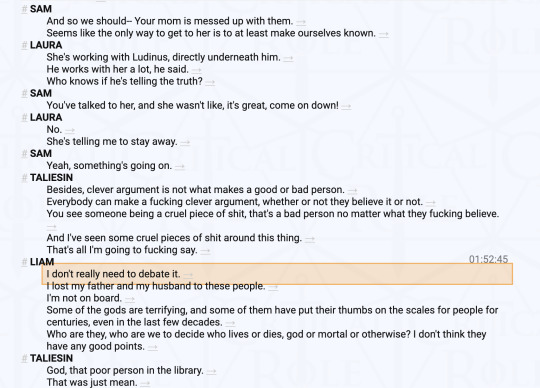
3. Episode 49. He brings them up combatively ("Well, Imogen, I wish. my family didn't have to die for their brighter tomorrow"), against Imogen's statement of, "What if it's not that bad? [...] What if what we're doing is just fighting change?" after she solely received a vision of a Utopia-like future from her mother. Imogen backs down quickly after his reproach and acknowledges that the vision was likely a part of cult brainwashing.
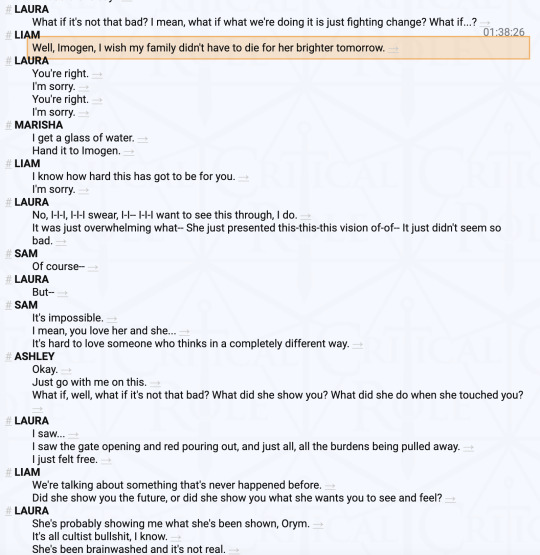
4. Episode 61. Orym pulls Prism aside, after she asks the party and Elder Abbadina if Predathos would cause a world-ending event, or if it would only be bad for some (the Elder did not know anything about Predathos at all), to say, "I don't think we know anything [...] The only thing I have to go on is the track record of the guys trying to bring Predathos out. And that track record is not very good." At further prompting from Prism about if he ever thought the Vanguard's ideas were right, he says, "Prism, I don't understand the gods. I don't know anything about the titans. I don't know an eidolon from eyeliner. [...] But I'm a widower, because of the people who want to bring this about. So it's hard for me to wrangle with the other side."
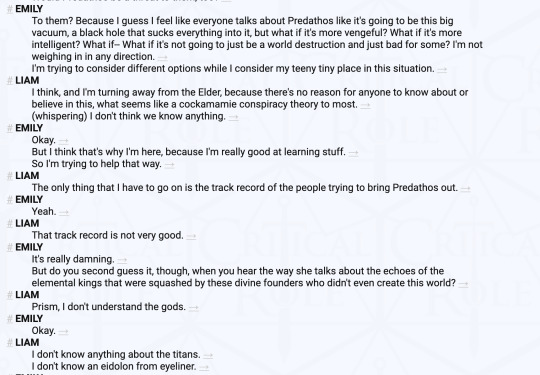

5. Episode 61, pt. 2. Orym listens to the party converse with Elder Abbadina for a little while longer before silently sneaking out "to go think about his dead father and his dead husband."

6. Episode 77. Another God Talk™️ with the whole party, prompted by FCG asking what everyone's motive was in going to the moon. For his reasoning, he says, "We don't know what's going to happen to any inch of this world if Predathos is unleashed. Yeah, this started with my husband and my father. It's so much bigger than that. If my life can secure the lives of everyone who comes after us, well spent."
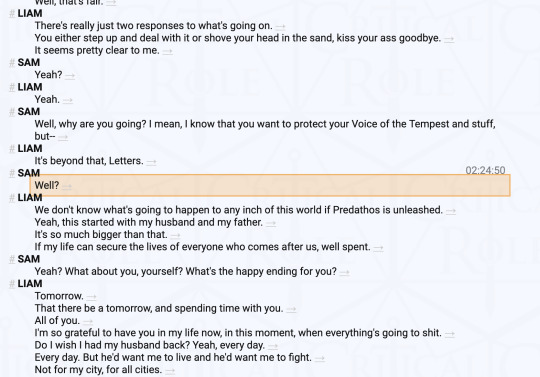
7. Episode 92. After the death of another loved one to Otohan Thull, in response to Liliana's statement that temples might hunt down Ruidusborn in the theoretical event that Ludinus' plot is foiled, "Cold comfort for my family in the ground."
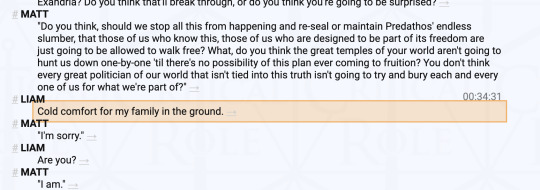
8. Episode 92, pt. 2. In response to a throwaway, thoughtless comment Ashton made that, "I hope [Liliana] is right. I really do. I hope her ends are fucking great because these means are just not forgivable." Orym has Chetney bring out Otohan's sword, jams one into the sand and declares, "This is the sword that killed my father and my husband. She is not right."
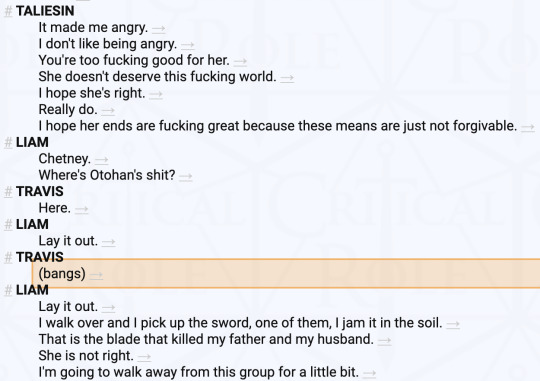
UPDATE: 8/14/24
9. Episode 102, during the confrontation with Ludinus. Interjected during the ongoing conversation, specifically during some bantering between Chetney and Ludinus as to the last time they met (when Chetney attacked him as a werewolf). He says, "You put a hit on my family, a successful one, fuck you. Fuck you." Ludinus later apologizes for the deaths of his family, claiming Otohan was "overzealous in her methods." Both Imogen and Laudna respond immediately that he was responsible for Otohan's actions.


10. Episode 103, during yet another God Conversation. Orym tries to redirect conversation about Ludinus and the gods, stating that they are different topics. Ashton concurs, and Imogen states that she agrees with Orym that Ludinus doesn't get to decide for everyone. Dorian then interjects, "But the gods do?" Which prompts Orym's blunt response to him specifically that, "If Ludinus had sent people to your home, and taken brother and your father and countless others, how philosophical would you be about it, Dorian?"
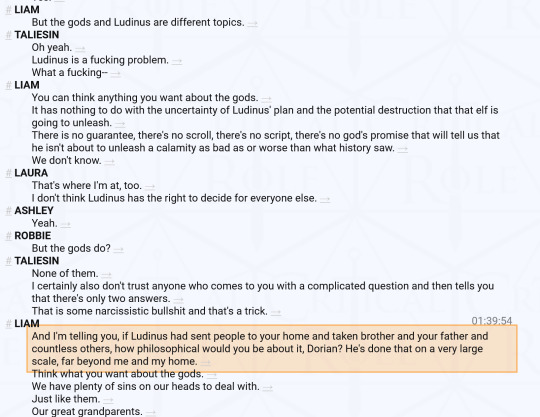
-
So, with all of the information in front of us, what conclusions can we draw from them? When asked by others to assess if the Vanguard has valid points, Orym repeatedly abstains from having an opinion. Whether or not the Vanguard has a reason to be upset is irrelevant to him--what is relevant is the loss of life they have incurred along the way. Orym takes no stance on the gods, he repeatedly states he doesn't understand them or know anything about them or harbor much of a connection to them. As far as he is concerned, his role in this is to oppose the violence being done to the people of Exandria. Why waste your time debating the merits of a cult's ideology when you know, in the end, you will have to fight against them to end the slaughter? To protect people?
And for what it's worth, in almost every instance, Ashton has effectively taken the same side as Orym. I have not included all of these moments, but they are easily located if you wanted to search up these moments on your own. The continual focus on de-legitimizing Orym's opinion seems strongly tied to the fact that he has a personal reason to hate the Vanguard. But facts being facts, Ashton hates them just the same--and he has no love of the gods, either. He hates the Vanguard based on their actions, same as Orym. In fact, Ashton and Laudna have both expressed outright dislike for the gods, and all other Bells Hells except for FCG expressed ambivalence. This is not about the gods. Not for Orym, not for the others who remain. This is about no more bodies on the pyre of Ludinus' machinations.
P.S. if you know of any other instances this topic has come up that I have not included, please feel free to let me know! I want this post to be as comprehensive as it can be, but I am fallible and may have missed something. Don't be afraid to tell me about a scene I missed!
#is this a little bit petty? yes#but also i genuinely did want all the info in one post for reference's sake#so hopefully this reference has helped others as well as decent compilation of information!#cr tag#I contemplated maintagging this. but. maybe that's a little too petty even for me#anyway the people who want to find this will probably find this. so.
207 notes
·
View notes
Text
"I’ve already pretty much revealed that Alecto begins with the descent of Christ into Hades."
- Tamsyn Muir
That's right...it's time for more Bible study for fans of weird queer necromancers!
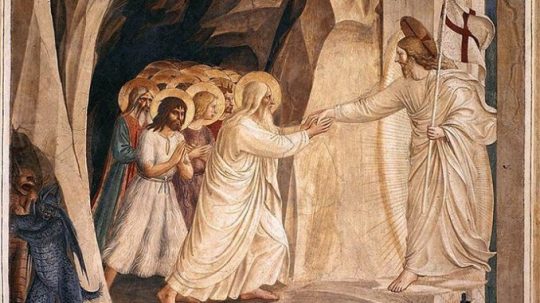
It's currently Holy Week, the week where Western liturgical Christians reenact the events of Jesus' death and resurrection in real time. And today, it's Holy Saturday. So Jesus died on the cross on Good Friday. He rises from the dead on Easter Sunday. But what happened in between? His body lay in the tomb...but his spirit was otherwise preoccupied. Because on Holy Saturday, Jesus went to Hell.
But why would Jesus go to Hell? Because the resurrection was not just about saving the people who came after it - it was a bit more...wibbly wobbly, timey wimey.
To be a bit more specific, he didn't visit Hell Hell. The place Jesus visited isn't Hell in the sense of eternal punishment of the damned, but Hades or Sheol or the Underworld or Limbo - a place for those who were mostly good but lived before Jesus' resurrection had made salvation possible. So before his resurrection, Jesus went to make that salvation retroactive. Particularly, according to tradition, to major figures from the Old Testament, including Adam and Eve.
So Nona the Ninth ended with Harrow walking off into the River in search of theological truth. And Alecto the Ninth apparently begins with Harrow in Hell:
Alecto the Ninth, ACT ONE
HARROW IN HELL
CHAPTER 1
At a point in the slit she was carving through life, Harrowhark Nonagesimus woke to find herself lost in a dark wound. She had been walking when it had all gone black– any path ahead or behind was blotted out; now she was here.
- Tamsyn Muir reading at TorCon
This is riffing heavily on the beginning of Dante's Inferno:
"In the middle of the journey of our life I came to myself within a dark wood where the straight way was lost."
- Dante Alighieri, Inferno
But lots of people go to Hell. What's so special about Harrow going there? Because the traditional name in English for Jesus' chthonic salvation adventures on Holy Saturday is "the Harrowing of Hell." "Harrow" comes from an Old English word meaning to attack or despoil - a very martial way of expressing the idea of Jesus as the victor over sin and death.
Harrow ended NTN realising that she cannot trust John's account of metaphysics. That she needs to discover the reality for herself. The faith of the Nine Houses and John's own styling as god rests on the foundation of the Resurrection - John is the "ransomer of death, scourge of death, vindicator of death", his power is understood to be absolute: "Let the whole of everywhere entrust themselves to him. Let those across the river pledge beyond the tomb to the adept divine."
And yet even that prayer - "let those across the river..." - introduces doubt. Magnus jumps in to silence Abigail when she expresses her heretical belief in the River beyond, and Harrow herself scoffs that "it has been thousands of years since anybody bothered to believe in the River beyond." Abigail believes that John knows nothing about what exists beyond the River. And what about Hell? In HTN, Ulysses the First is described as "languishing in Hell" after his run-in with a Resurrection Beast. John himself describes the stoma as "the mouth to Hell", "a portal to a place I cannot touch - somewhere I don't fully comprehend, where my power and my authority are utterly meaningless."
In the Book of Revelation - the Bible's account of the end of the world - Jesus holds "the keys of death and Hell". John may have resurrected the dead, but he does not comprehend what is beyond it. Both the destination of the good, the River beyond to which the souls of little Isaac and Jean should have traveled lightly after their short and brutal lives, and the Hell that lies beneath the stoma are outside of his power. He is a few keys short of the full divine bunch. He can manipulate death, but he is not really its master.
And so Harrow walks off into the River to look for something or someone she can call god. Harrow, who shares a name with the defeat of death across time and space. Harrow, who is of the unbroken line of Anastasia. Anastasia was kind to Alecto, who like Eve is the mother of all and like Adam walked on the empty earth with god.
In Orthodox icons, the Harrowing of Hell is depicted with Jesus triumphant, leading Adam and Eve by the hand from their tombs. The traditional term for this image is an anastasis, the Greek term for resurrection. Adam and Eve, whose sin broke the intended shape of reality, are restored to wholeness with god.
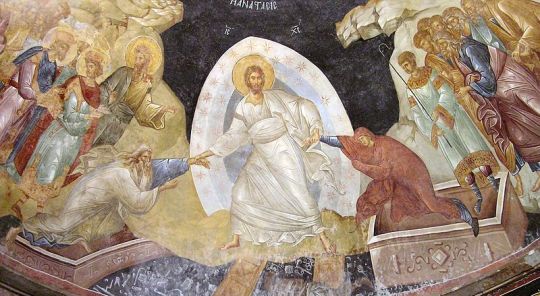
How will Harrow answer her questions about god? What really is beyond the stoma and what would it mean to conquer it? What does it look like, metaphysically, to restore the world of The Locked Tomb to wholeness, and what will it cost?
247 notes
·
View notes
Note
Hello sorry if this is a bother but I am asking in good faith where is the reading for transmasc nepeta. I’m asking this cuz of your last ask (the June one) and I see aradia Dirk and Jane. Thoes all I have seen post and analysis about. But I have not really seen anything about nepeta.
Okay so first thing you gotta understand is that gender in Homestuck, for lack of a better way to say it, can be understood in how characters reflect and relate to each other. That being said to understand Nepeta's gender, we gotta understand the gender of at the very least one other person.
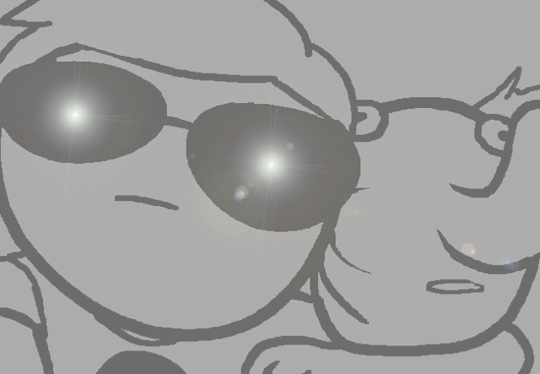
Dave.
And more specifically.
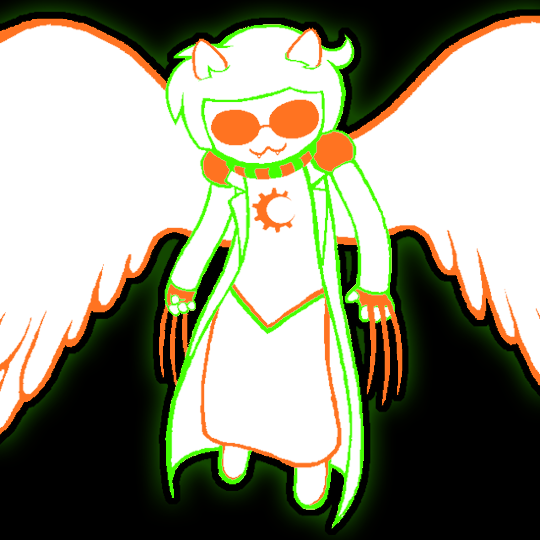
Davepeta, Homestuck's very own first(ish) trans character.
Davepeta is noted to be a sort of platonic ideal of existence for both Dave and Nepeta. Somehow, through a strange series of cosmic coincidences, these two end up making an odd sort of parallel. Both having a strange relationship to a man who loves him some goddamn horses. The whole Akwete Purrmusk thing. I mean, Dave canonically engaged in semi-nonironic furry roleplay with Nepeta offscreen, and given what we know about what becoming a furry in Homestuck means, it's not a leap to describe this as their ideal form.

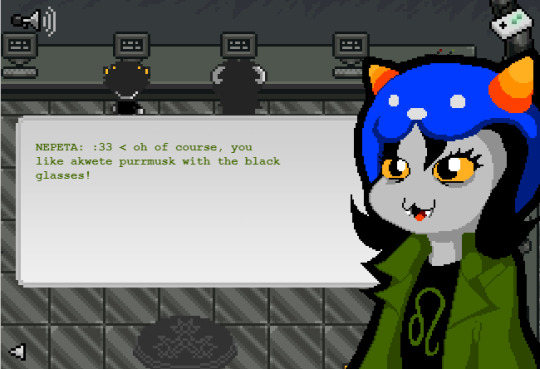
But, although we don't see a lot of Nepeta's character arc, we do see a lot of Dave's. He struggles his whole life under an incredibly oppressive masculine force (both of Bro and, indirectly, Lord English), and once the game is over ends up deconstructing and largely rejecting that.
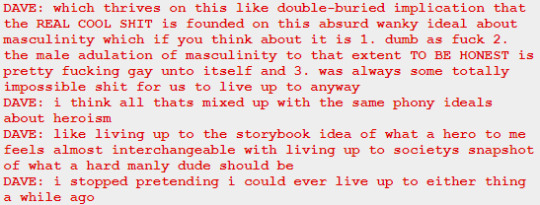
So when Davesprite, who's also probably been thinking about this for even longer, bereft of purpose or identity, finds a kindred soul in a spunky catgirl... well the rest is Davepeta.
And similarly, there are points in the story where Nepeta acts kind of uncomfortable with how others see her as exclusively something to be protected. The whole "Dear, sweet, precious Nepeta" grates on her early on, as Equius uses it as an excuse to control her actions. The whole of moiraillegience as it is originally explained (i.e. one party helps to calm down an especially brutal and violent person from outbursts of anger, and in turn that person will protect the more docile, even-tempered soul from external harm) even kind of FEELS like the way heterosexual relationships are portrayed in a lot of conservative spaces, where women are nuturers and caretakers while men are protectors. And Nepeta is supposed to, in this situation, be the person who helps Equius manage his emotions, which she feels some consternation at!
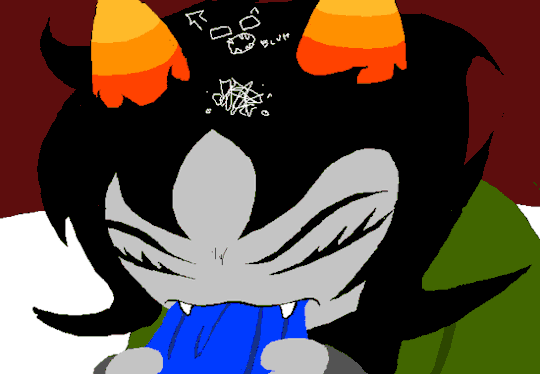
Now, over the course of Hivebent, their relationship appears to evolve and get a bit more balanced, but it still carries these overtones of "I will protect you, and you will handle my outbursts." Notably, when Equius goes to seek the Highb100d, and leaves Nepeta behind.
And of course not after roleplaying as each other.

Which. I mean come on.
But notably, Nepeta doesn't just stay put! She doesn't really want to be protected all the time! And when push comes to shove, she leaps out to defend, or at the very least avenge, her best friend.

And then, we don't really see Nepeta for a while!
Until we get to the end of the comic.
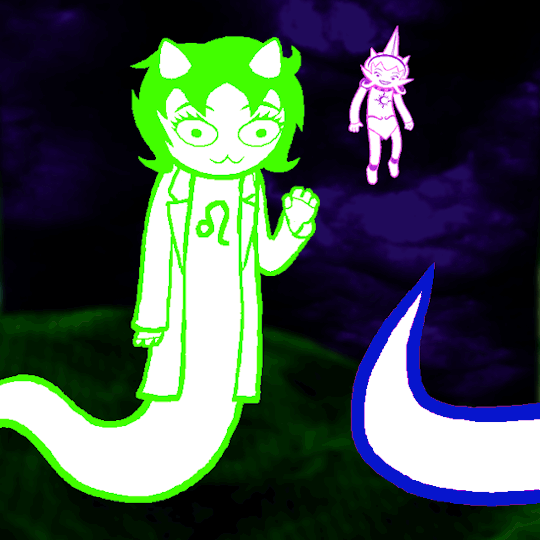
During their whole "date", Nepeta seems a little uncomfortable with Jasprose's affections. She may be a bit flattered, but Jasprose also fully admits later that she was frankly looking for any girl she could fall in love with after the tragic death of her girlfriend and possible more tragic untimely resurrection.
But then the pivotal handshake happens, and we get to see who is perhaps the most happy being in all of Homestuck.

Then we get into some of the only actual discussion of gender in Homestuck. We don't get much besides that, for both of their lives, Dave and Nepeta both felt something was missing. Something felt wrong that they couldn't quite place that made them both miserable. I don't think it's a massive stretch to say this could be gender dysphoria.

And when they combine, they feel the fullness of the gendered experience they were missing, melded together like a two-piece puzzle.
Now while the abovementioned "strong identities as a boy and a girl" might throw you off, I would point to what Victoria Lacroix said about this passage: note the lack of the word "respectively." I rest my case.
Now full disclosure, my personal headcanon for Nepeta is genderfluid transmasc. The whole affinity for roleplaying lends itself to a more shifting identity and I just think Nepeta, given more time, would love exploring the little nooks and crannies of gender.
This isn't going into the more complicated shit with Gender when it comes to Equius and Dirk and all that other stuff. Here's a quick summary so you can see exactly how my brain is broken.

Anyways, thanks for the question! I hope I answered my thoughts on the topic adequately! If other people have more to say about this, please feel free to add on!
205 notes
·
View notes
Note
How can Molly's death be considered a major mistake? It's the crux of the entire campaign.
so I think about this a lot, because you're right, and it really comes down to like...a lot of factors in how people interact with fiction, and some stuff I feel about fandom.
The short answer is that Molly is some people's favorite character, and they really wanted to watch him for 141 episodes and not just 26, and they didn't get to, and so it's valid to feel sad about that. But I think what personally grinds my gears is the idea that it's a mistake and because this is a Fan Favorite character he SHOULD have come back. Setting aside the fact that he had both his fans and his detractors from the start and a lot of people (myself included) who found him irritating didn't say much for a good chunk of C2 because, well, he was dead, this isn't a fucking competitive reality show. You don't get to vote on your phones to decide who wins a resurrection.
I think the longer answer is that there is a certain type of person in fandom, born of a certain type of person in social media communities, who just...is not willing or interested in considering not just that their experiences, preferences, and philosophy are not universal, but also that they are not objectively best and correct and that everyone who disagrees is wrong. It's often really common in, though not exclusive to, people who have particularly limited experiences - young (like, teenager/early 20s), people who haven't lived in a diverse area or in multiple different areas, people who for whatever reason do not get out much - which both makes sense (haven't been exposed to a ton of different perspectives irl) but also means that you get people who, for all they may talk about global politics, kind of unconsciously seem to act as though everyone they interact with online is a variant of someone from the same 3000 person town in the United States in which they've spent all 21 years of their life. ANYWAY getting back to the main point I feel like Molly attracted a lot of that kind of person, who just...doesn't get that while Molly is, to them, a deeply validating expression of gender identity, for many people he is "guy you meet at your friend's birthday party in a two-bedroom 6 floor walk up and within 5 seconds he has pissed you off so profoundly with his overfamiliarity that you go into the kitchen and mainline as much vanilla vodka as possible to not stab this guy with a secondhand knife that says "CHEESE!" on it even though you hate vanilla vodka and it's summer in NYC and you're on the 6th floor in a small apartment with too many people so it's approximately 117 degrees Fahrenheit in this kitchen and the vodka isn't much cooler, and you succeed in this goal, and then after sending your friend who couldn't make it because they were at a family thing that weekend a picture of a rat on the tracks of the 3 train with a caption "this u?" at 1:54 in the morning you're like "so this guy Molly was there" and they're like "oh my god I met him at Cameron's last party, he SUCKS" and you're like "I KNOW". Like a lot of people just do not get that Molly was very popular with their circle, and also a lot of people either were neutral-to-not-feeling-it. This is before we get into the post-death idealization of who he was that takes him from "irritating but I think he'd have grown on me in some ways eventually had he lived" to "horrible and insufferable fake-ass bitch."
And then we get to the true impasse: the idea that something that does not fulfill every single one of your personal wishes might still be a great story.
I'm certainly not perfect, and there's things I thought I wanted for the end of C2 that I didn't get, and there's some things I do wish we'd have gotten to see (or that we'd have done in C3), but I like to think that I try to remain at least partially open to the possibilities. I like to think that my enjoyment of a story isn't contingent on whether one single character survives, even if they are my favorite (and I say this as someone whose favorite ASOIAF character was immediately Ned Stark, a statement that should surprise no one who follows me) nor that the story precisely reaffirms my existing worldview. I want stories to tell me something new and interesting that wouldn't come from my own head, and I want them to sell me on it. I think that a lot of people lost the thread of the importance of representation, namely, they forgot that while it's great to see people like you in a story, you should also be trying to see people not like you and perspectives that aren't yours. I am extremely defensive of my and other people's right to say "I didn't like this story and here is why" without someone being like "Give it a chance! Here's why I think it's good" but at the same time, there is a difference between "I really wish Molly had stayed alive and I don't like that he died," and "everything that happened after he died was A Mistake because it wasn't what I Wanted, and someone should fix this." Like that's what toddlers do. That's not an adult way of interacting with narrative.
So those people don't even get to the point of "the entire campaign is deeply influenced by the loss of Molly; that is what binds the rest of the Nein together and makes them what they are; the fact that Lucien wears the face of a departed friend is crucial to the entire final arc comprising about 20% of the campaign; and the fact that he does not come back, but someone new, with new chances and new choices to make does is emblematic of a campaign about people who find that they cannot undo their pasts, but neither are they trapped or damned by them." They're stuck at "guy I liked died and I'm throwing a tantrum 6 years later."
93 notes
·
View notes
Text
I have written many meta posts and s3-theories, and read even more, but I got hit by an idea I have not seen before. (If there is another post, please link it!)
After vibrating for an hour and losing my mind in my dms, I have no scraped together enough brain cells to present what is probably my first actual 'main-plot meta'.
Welcome to another edition of Alex's unhinged meta corner, today with a title to honour Crowley's James Bond obsession and the possibility of another heaven heist.
I give you:
From Jesus with Love - You Will Live Twice
Now, let's get right into it.
I think Neil might have told us more about the main s3 plotline in the announcement article than we previously thought. We all got stuck on 'they're not talking'—for good reason—but it is the part before that which has been bugging me ever since then.

The plans are going wrong—and this time that is a problem for earth and humanity. Turning that around, it means that whatever that plan consists of would be the way to go and beneficial for everyone, the opposite of the main plot of s1.
"They need to prevent the Second Coming (SC)" is pretty much the only and most popular idea I have seen, hundreds of fics and metas and whatnot have been written about it, but I think there's a good chance we're wrong. If we're not, well, I will honestly just be happy to be watching season 3.
Whatever the Metatron is planning will have negative consequences for everyone, or as Michael puts it: "And so… it ends. Everything ends. Time and the world is over, and we begin Eternity… forever and ever."
It sounds very much like Apocalypse #1 - Same Old Plan, same expected result, yet if we look at different interpretations of scripture we find that the SC is not entirely about complete destruction and death for all of humanity—it is about creating a new world/migrating to the kingdom of God.
This is taken from the Wikipedia article about the SC

Resurrection and life in a world to come are a direct contradiction to the result Michael is explaining—total annihilation of humanity.
Now, I am neither religious in any way nor have I ever received any sort of biblical education. Luckily, Christians seem to love talking about the bible because there are dozens of bible website to wade through. If I get anything wrong, please point it out, I have never touched a bible in my life.
So, after reading many, many quotes by a bunch of different guys, I tried to create a somewhat coherent picture of what the SC might look like based on the assumption that the end result is positive. I will talk about how they can be interpreted more in-depth later, otherwise this would turn into a string-net very fast.
Additionally, we can also see where these points overlap with the statement Jimbriel gave in the bookshop in episode three.

What is Jesus' job description?
only God knows when and how exactly it will begin/happen, no one else does, including Jesus and the Metatron
a lot of different catastrophes are mentioned or quoted as something Jesus said, like earthquakes and storms -> Jimbriel mentioned a tempest and great storms
there is also the line "All these are the beginning of birth pains." Birth pains dictate that there will be a birth—birth of the world to come perhaps?
dead people will be resurrected/leave their graves so that they too can be judged (I'd say participate in it but that sounds like the Second Coming is a summer camp activity)
there are also mentions of stars and the heavens in general falling from the sky and the sun going dark -> Jimbriel also mentions darkness as one of the signs
great lamentations, as Jimbriel says, are also a part of many different passages, with humans mourning the world as it was
the Lord will descent with the voice of an Archangel and the sound of a trumpet/the trumpet of God; the grammatical structure of that sentence seems to be interpreted differently depending on who you ask, but the voices of angels/an Archangel and some sort of trumpet are common terms
once everyone is in heaven/wherever the 'main even' will take place, a judgement call will be made for every single person in relation to the book of life, which decides whether they will be punished forever or not (one passage talks about a lake of fire and mentions it several times in a row)
And this is where it gets tricky. To figure out what the SC looks like, we first need to understand a) what the Metatron's capabilities are, b) what he has to lose, and c) what exactly would be a threat to him.
If you ask me, all of this comes down to the Metatron wanting to stay and be in power for eternity with full control over angels so he can do as he please, aka keeping the system running as it is.
We know the book of life (bol) is a thing in the Good Omens universe, whether it does what Michael said is an entirely different question. So far, we have also only got confirmation that hell collects and tortures souls—in such large amounts that they are understaffed—while heaven looks completely empty.
The Metatron runs heaven as an institution, he seems to be the highest power any of the angels have access to and the one they defer to. He refers to himself as the voice of God and combines judge, jury and executioner, making him one great celestial dictator.
From what we know of hell, they do things a lot more democratically, having different councils, dukes, and ranks that are responsible for different levels of command.
We also know that that the Metatron wants the world to end, his goals can probably be summarized as the statement Michael makes, which would leave him in charge without any opposing forces.
We also also know that he sees Crowley and Aziraphale as a threat—why exactly remains a mystery for now—and that the success of his plan hinges on having a Supreme Archangel (SA) he can control. Gabriel decided to become princess of hell and Beez' sugar baby, so he was out of the equation, and after the Armageddon disaster, I don't think he wants to risk failing because of an unfamiliarity with earth (plus, y'know, getting our two idiots away from the plan).
It's interesting to me that right at the end, he says to Aziraphale "We call it the Second Coming"—call, not it is or it will be, CALL. We know that nothing Neil writes is a coincidence, definitely not with such an important line.
Just because you CALL something a specific name doesn't mean it IS what you call it, e.g. Aziraphale calls Crowley a foul fiend when we know he very much isn't.
The Metatron is selling his plan as part of the "Great/Ineffable Plan", so any questions can be blocked by saying it's God's will, it's ineffable. Whatever his plan is, he hides it behind the concept of the Second Coming, which angels know just enough about to understand the basics without having in-depth knowledge of what exactly it entails.
It is a good fucking strategy, I'll give him that, and it WORKS because angels—even if they have doubts—do not question. They simply don't; fear of punishment and millennia of conditioning have left them in a horrible place. When they encounter something unknown, their response is "I already knew that" as to not ask questions.
Crowley questions, we know that, and Aziraphale, ohhhhh, Aziraphale ALSO questions, but he does it in a less dangerous and obvious way. The Metatron is vastly underprepared for that.
(Side note: That alone would be its own meta post, but the gist is that he questions heaven's plans and then adjusts his assumptions of what God might want to what he WANTS God to want, e.g. Job, the Arch)
To summarize everything I just said, the Metatron wants to do what Armageddon failed to do—destroy earth and the universe—so he can be supreme dictator of all remaining celestial beings and gorge himself on power.
But instead of calling it his Big Evil Plan, he calls it the Second Coming, making everyone play along without resistance.
We cycle aaaaall the way back to the sentence I quoted—the ACTUAL plans are going wrong since the Metatron's would mean total destruction.
But what is the SC supposed to be if not the Apocalypse 2.0?
When I look at all the different aspects of the SC and assume a positive outcome, then the end result to me would be a new world that is pretty much like the old world, or maybe even literally the old world but with any destruction reversed. Heaven and hell get dissolved since now that everyone has been "judged", they as institutions are no longer needed, they have fulfilled their purpose.
No more judgement means there is no reason to keep track anymore, so why do you need to run celestial corporations whose only job is doing exactly that? You don't—and THAT is what I believe is the biggest perceived threat to the Metatron, losing full control over everyone and everything, losing his position, his title, and whatever else he has.
On top of that, Good Omens has told us again and again that God doesn't seem to give a fuck about good and evil anymore, and that without heaven and hell being all wrapped up in it, humanity would have 100% free will without any consequences.
Maybe the BoL is empty, maybe it isn't real, maybe Jesus stole it to straighten a wobbly table, who knows. There is a chance it is what Michael says, but I would admittedly find that a bit. too obvious and boring since it would boil the plot down to "they save their own asses again" and not "they save humanity at all cost".
Regarding Crowley and Aziraphale's role in this—I have Thoughts TM but those definitely need their own post. In short, they have to get the SC back on track, the real one.
-
If you have made it this far, thank you for working through what I hope are more or less coherent rambles. Any spelling or grammar mistakes are my own.
Questions? Thoughts? Corrections? Expansions and additions?
Feel free to add to this post however you like (and I can't believe I have to mentions this but if you clown on my post or behave like an asshole you will be blocked).
#alex talks good omens#good omens#crowley#aziraphale#good omens meta#good omens season three speculation#good omens season 2#go2#aziracrow#crowley x aziraphale#ineffable husbands#ineffable wives#ineffable spouses#ineffable divorce#the final fifteen#good omens s3#good omens speculation#good omens theories#metatrash#the second coming good omens#long post
195 notes
·
View notes
Text
there are literally so many reasons why we don't need a third Narnia adaptation
first of all, while they might not be the most accurate, the Disney movies are actually so good and, in my opinion, still manage to capture the heart and soul of the series and what it's truly about. The characters are each perfectly portrayed; the Pevensies act like actual siblings and yet love each other dearly and would die for each other even through all the petty arguments; the music creates perfect atmosphere and emotion and never fails to make me tear up or get shivers down my spine; and the CGI is honestly just absolutely stunning.
I really do not feel like we need another adaptation by Netflix.
Especially not through Netflix.
Netflix has already been known to mess up so many shows and movies by completely changing the source material or adding in unnecessary things that completely take away from the purpose of the story. I can already see them warping Narnia into something that barely even resembles the books, that strips it of its purpose and simply makes it about a fantasy world, nothing more. I've already seen posts saying that the new movies just can't end the way the books end, that heaven must be explained away, that Susan never forgets and falls down a dark path, that the faith aspect must be taken out so as not to offend new viewers.
Here's the thing.
If you take faith out of Narnia, you remove the very heart of the series. you remove the entire purpose. Because Narnia is entirely about faith, and trust, and Someone greater than yourself who sacrifices everything to save your own traitorous soul. the Disney movies did not shy away from portraying this faith as openly as possible. if anyone was offended, I've never seen proof. I have seen many nonbelievers talk about how much they were affected by Aslan's death, which goes to show that you simply don't have to be Christian to understand what Narnia is about, and to love and enjoy it.
So if these new remakes remove the faith aspect, then what is the point? four siblings go to a magical land and save it from a witch and befriend a talking lion with nothing special about him and live there as kings and queens and return home and live happily ever after? there is no sacrifice, there is no "he's not tame, but he is good," there is no creation, there is no redemption, there is no last battle, there is no "in your world, I have another name", there is no sister straying down a dark path because she has forgotten how to hope, and then returning because her story is unfinished and the road to heaven is paved with flowers that symbolize her name.
so then, what are you left with? Aslan is just a talking lion, nothing more. the stone table never cracks, the sun never rises. "That by knowing me here for a little, you may know me better there" is forgotten entirely, because why would Aslan exist in our world if he is merely a talking lion in Narnia? Aslan's country is changed to be something else, and there is nothing about how Aslan suddenly no longer looks like a lion, and how the things that happened after are more great and beautiful than can be described. Edmund's life is never threatened because of his traitorous deeds; Aslan never offers his own life in place of a guilty boy, is never killed, is never resurrected.
the very core of Narnia is removed, and what you are left with is emptiness.
sure, it might make for a good fantasy story nonetheless. you might still have sweeping views and epic music and an intriguing plotline, but something will always feel like it is missing. like there is an empty hole, desperately needing to be filled.
of course, I don't know that all of that will happen; it's just speculation at this point. But I am fairly sure that it is safe to predict these upcoming movies as such. I highly doubt the producers will want to include the faith that shapes Narnia, because according to them, having a faith aspect means less viewers since too many people would be offended.
but if only they would look at the already wonderful existing adaptations, they would know that is simply not the case.
#i can already see cs lewis turning in his grave#this really just feels like another tired live action remake tbh#netflix keep ur shabby hands off of my beloveds or i will beat u with a broom#ANYWAY I AM ALSO TERRIFIED OF WHO IS GOING TO PLAY THE PEVENSIES#SKANDAR AND WILLIAM AND GEORGIE AND ANNA WERE ALREADY PERFECT PLS LEAVE MY CHILDREN ALONE#also so help me if people like these new movies better#when the disney ones are perfection imo even tho they're not fully accurate#and i would like to see them try to beat the music. i would like to see them try.#narnia netflix#netflix narnia#narnia#the chronicles of narnia#aslan#susan pevensie#lucy pevensie#edmund pevensie#peter pevensie#cs lewis#ramblings from the void
260 notes
·
View notes
Text
Macaque study # S4 SPECIALS
Let's go with Macaque in the special of season 4! There will be a lot to say here too. The specials offer us a very interesting insight on what happened between Wukong and Macaque while also taking the first step towards their reconciliation.
The first appearance of Macaque in the specials is immediately centered around Wukong (and his conflict with him).
MK : We have to try! He'd do the same for any of us.

Macaque averting his eyes while MK says this very sentence is not coincidental. Obviously Macaque doesn't think Wukong would really do this if it was for him. After all, Macaque still has this image of Wukong he's fueling. The one of a selfish person who doesn't care. Yet Macaque still wants to go with MK. This time MK didn't even ask him to help, Macaque stepped up on his own. I think it's important to notice this because Macaque could have just chosen to not care. Contrary to season 3, nobody asked him to save the world, nobody asked him to help. Perhaps because they're not sure of his position in the matter.
Yet Macaque still chose to help on his own. It really shows how much he really cares about this even if he acts like he doesn't by being grumpy.
Within the first few minutes of Macaque being inside the scroll of memory, he already showcases a lot of familiarity with Wukong past self and Wukong in general :
- He instantly recognizes that the Wukong they see is a memory (perhaps because he knew Wukong at this state in his life?)
- He said that he can “smell him a mile away” which while very funny also portrays a sense of familiarity. I did some research on that and while old world apes like rhesus macaques don't have a strong sense of smell, they do use smell to differentiate between members of their social group. Macaque being used to Wukong smell can portray how Macaque was a part of Wukong social group back in the days.
- And finally the lil monkey they find immediately attach itself to Macaque rather than MK. It does really show how Macaque lived on the island with Wukong, and how contrary to any other members of the brotherhood, Macaque lived with the monkeys. He was part of the troop. And the monkeys probably missed him a lot too.
Those are rather oblivious details, but it does set the record for the rest of the specials. Macaque was very familiar with Wukong, probably more familiar than any other members of the brotherhood. He was part of the troop, he lived with Wukong. Wukong was his king.
I think it's also really fun how Macaque tells MK to read JTTW. When they come across Wukong training under Subodhi, Macaque specifically tells how this scene is in chapter 1. That means Macaque himself have read the book. Maybe, after being resurrected, Macaque got curious about the journey and decided to read the book, or he just wanted to know what happened to Wukong after his death.
After this, they both stumble upon a very important scene : Macaque under the tree on the beach and Wukong coming to him.
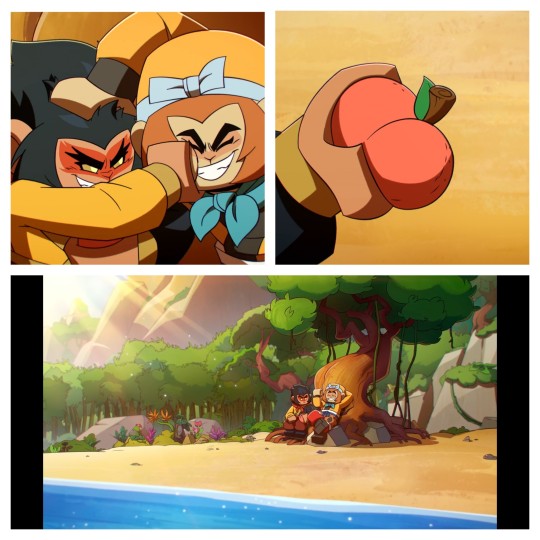
There is a lot to say in this scene.
Wukong : Macaque, you're okay bud?
Macaque : Welcome back your majesty
Wukong : ah, don't be like that. Eat some fruits, suck up the sun. That's why I've been training so hard.
Macaque : What? So you can be the strongest?
Wukong : Nooo well maybe a lil bit. But that's not the point! It's so we don't have to worry about anything or anyone ever again. Just live a lazy life sitting in the sun, eating fruits. And doing whatever we want. Sounds pretty good? Huh? Huh?
So with nothing but the dialogue we already got the key points of Wukong's motivation, his fatal flaw that led to his downfall and the basics of his relationship with Macaque.
First, Wukong is mainly driven by the need to protect others. The first thing he tells Macaque when he sees him is “Are you okay?”. And while at first we can assume Wukong is simply overprotective, we also see Macaque bandaging himself before Wukong comes to him. That does show that whatever threat Wukong was desperate to protect Macaque from (poachers, demons) it does exist. Flower Fruit Mountain, while being a rather difficult place to reach and thus quite protected, is not completely safe. Macaque can still get hurt.
Second, Macaque is sarcastic when he says “your majesty”, that does showcase that while Wukong is a king, Macaque doesn't treat him as one. He treats Wukong as a friend. That's why he uses this title so lightly. Macaque's light jab “welcome back” is also most likely an allusion to Wukong's frequent escapades to become stronger. Clearly, Macaque is annoyed by Wukong's absence. Maybe he feels like a servant of some sort, waiting for Wukong to return.
What I find interesting is that we can see here how Macaque is much more comfortable with Wukong alone than with the brotherhood. Here, Macaque is not afraid to express his dissatisfaction with light sarcasm. Whereas, in the brotherhood, when Peng was mocking him, he didn't reply at all and kept quiet.
Third, Wukong's flaw shone through the interaction despite his main drive (which is to protect). Macaque is aware of Wukong's flaw when he replies “What so you can be the strongest?”, and even Wukong recognizes his thirst for power. This is really important because it's a key point to understanding their downfall. While Wukong's intentions were originally good, he let his desire for powers and glory blind him. At this point in time, his desire still doesn't take precedent over his dream. But the more he'll gather power, the more he'll lose sight of why he started this quest of strength for. The more he'll lose sight of Macaque. The more he'll keep feeding this desire with Azure's recognition.
And like the scene of the brotherhood banquet, Macaque is reassured when Wukong mentions their dream again, more likely comforted by the fact Wukong didn't forget their common dream. Truly, even at the earliest stage of their friendship, Macaque already had the fear of being forgotten .
[ Apparté : I think it's sweet how we sees Wukong idea of a paradise : he needs “sun”, “fruits”, “safety” (proof in his words : “we don't have to worry about anything or anyone ever again”) , “liberty” (“And doing whatever we want “) and “Macaque” (emphasis on the “we” He repeats constantly).]
Macaque: quit it, eat your dang peach
Wukong : you're a peach.
Lastly, this scene introduces us to the peach symbolism in Macaque and Wukong relationship.
We know how obsessed Wukong is with peaches, so for him to give one to Macaque is already a physical proof of his care. He even goes as far as to call him a “peach”. It might be subtle, but truly this is a great show of fondness and care coming from Wukong. Here we have two shows of affections coming from Wukong : gift-giving and endearments, all related to peaches because that's what he likes the most and thus is the ultimate show of his affection.
The peach represents their friendship. It also, in a metaphorical lense, represents longevity. As such, it can represent Wukong's desire for Macaque to be safe and to live a long life. Macaque accepting the peach is, of course, him accepting Wukong's show of care but also accepting his protection/ the longevity he gives him.
The act of gifting a peach is also metaphorically a wish for love, happiness and well-being. And I think this encompasses Wukong’s feelings perfectly. He wants Macaque to be well and happy. He wants to protect him and cares for him. And Macaque accepts this show of affection coming from Wukong.
After this particularly sweet scene, we get the scene of their downfall: the fight under the mountain.
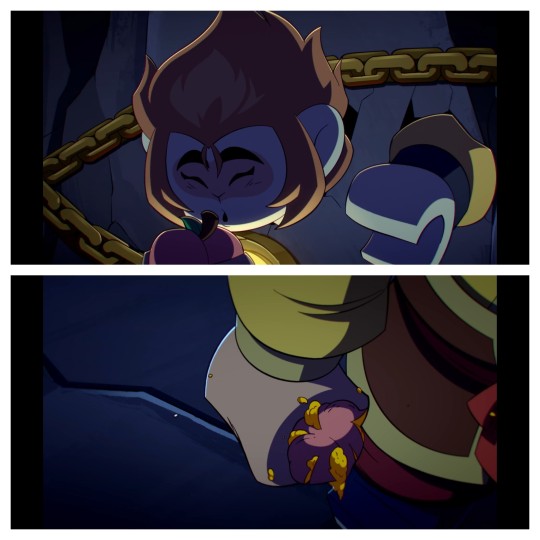
Macaque : Hey bud, I got a lil something
Wukong : What for me? You're not serious, that whole peach is for me? Oh bud, you shouldn't have!
Macaque : Okay, you don't have to be so you about it.
Wukong : no, no honestly this is exactly what I need right now. I'm trapped under the mountain but the Six-eared Macaque brought me a peach. Hooray.
Macaque : You know I'd help if I could.
Wukong : Oh sure, cause normally you just rush to my rescue.
Macaque : yeah, okay.
So with this first section of the dialogue we learns a lot already.
First, Macaque coming to hand a peach to Wukong is, of course, made to comfort him in his rough situation (peaches are probably his comfort food) but it’s also an offer of friendship. Macaque is offering his company. His friendship. Because, truly, he cannot offer anything else.
But Wukong's response is a very cutting antiphrasis, sarcasm in short. Very much like Macaque in the previous scene, he uses sarcasm to convey his frustrations and feelings. But it hurts way more here. Because Wukong is not only refusing the peach, he's also refusing Macaque company and friendship. He uses Macaque full title to create distance between them.
We can translate Wukong's antiphrasis like this :
- What for me? You're not serious, that whole peach is for me? Oh bud, you shouldn't have!
- I don't care about the peach. It's not what you should do!
- no, no honestly this is exactly what I need right now. I'm trapped under the mountain but the Six-eared Macaque brought me a peach. Hooray.
- I don't need the peach right now. I want freedom. You're the Six-eared Macaque and the only thing you can offer me is a peach? Why can't you free me? (I translated it like this because of the use of Macaque's full title. Here, for me, Wukong is mocking Macaque inabilities by saying his full title, full title being generally a show of power.)
What Wukong wants is freedom, more than friendship, more than company, more than comfort.
Macaque tried to convey his helplessness by saying that it's not like he doesn't want to help, it's that he cannot, he doesn't have the capacities to. But Wukong doubts Macaque's willingness to help with sarcasm once again.
- Oh sure, cause normally you just rush to my rescue!
- You never rescue me. You never help me.
Like we previously see, Macaque prefers to avoid conflicts rather than face them. When he sees Wukong unwillingness to listen, he rises and walks away. I think Macaque's position was really telling in this scene. He sat beside Wukong. Not in front of him. He lowered himself on the ground, maybe to lower himself to Wukong's level and not look down on him in a show of companionship, and sat at his side in an act of silent support. But when Wukong rejects that companionship (rejects Macaque), Macaque rises and walks away. He doesn't crush the peach yet but simply takes it away. Thus, it shows that their friendship has not been crushed yet. Macaque takes Wukong's rejection in stride and decides to take back his offer of friendship at the moment.
Wukong : Well it was great seeing you bud, just run off like you always do.
Macaque : No, that's you! You're the one who's always running off, looking for more powers, for more sources of immortality. You're one who wouldn't quit while we were ahead. Not the great sage, he's gonna drag everyone else into his mess.
Wukong : you're not in this mess, you're still free ! Everything I did was for us!
Macaque : You did it for yourself. You've become like this… obsessive demon. I told you going against the Jade Emperor was a bad idea, but no, Wukong doesn't listen to anyone. He just does whatever he wants. You put yourself there, not me.
Wukong : Fine! Leave! I don't wanna see your face here again you big- hugh. I really wanted that peach.
And that's the words that makes Macaque explode.
Wukong is definitely salty about something here, he mentions how Macaque always run-off, perhaps that's because he felt like Macaque abandoned him after his defeat against the Jade Emperor. Macaque most likely escaped with the brotherhood via a portal, it would explain how they were be able to avoid the heavenly soldiers after Wukong’s defeat. Wukong most likely felt like he was left behind, tossed away the moment he lost, and resented Macaque for this.
Macaque on his part is furious because he felt like he was the one who had been abandoned. It's not Wukong who has been abandoned. It's him. He emphasizes this feeling by reminding Wukong of his numerous escapades and repeating the verb “running off” that Wukong used, trying to show Wukong that he's not the one being abandoned, it was Macaque all along. This is probably a boiling feeling who festered for a long time and exploded here. He also emphasizes Wukong's flaw by mentioning power and immortality. Essentially Macaque is calling out Wukong on his flaws, saying that he forsake their common dream for strength and longevity. He uses the title “Great sage” as an insult, probably to mock Wukong's desire for grandeur, and also put the blame entirely on Wukong, saying that he's the one who dragged “everyone else” (Macaque, monkeys and the brotherhood) into this situation. Which is largely untrue. This situation was the result of a lot of additional factors. But pushed by his emotions and his festered frustrations, Macaque is blind to this.
Wukong replies to this by saying that Macaque is not in this mess. Ignoring Macaque's own pain and wounds after the battle and only focusing on himself. Which we cannot truly fault him for. He's cut off from the rest of the world, being tortured daily, he probably thinks that the brotherhood and Macaque have great lives. But still, he's ignoring Macaque's pain. He also emphasizes how “everything he did was for us” ( in my opinion it’s a very romantic line, he doesn't say “everything I did was for everyone!” which would include the brotherhood and the monkeys, he uses “us”, which only includes Macaque and him.). I think at a certain point Wukong blinded himself, convincing himself that each of his choices were driven by his common dream with Macaque, when in truth, at the end, most were driven by his own selfish desires.
Macaque calls him out on this. It's interesting to see how Wukong is particularly angered by the moniker “obsessive demon”, probably because by calling him a demon (in JTTW, the representation of strides and enmity) Macaque put him on the same level as all the demons that came on FFM, the enemies Wukong was desperate to protect Macaque from. Macaque also emphasizes on Wukong's selfishness and how he never listened, again festering frustrations that comes in the surface here. In the end, he says Wukong puts himself in this situation, which is true. Wukong had the choice to stop this mad quest at any moment (as MK said in the previous scene, he was already strong enough) but he refused to. Ultimately, his demise and emprisonnement under the mountain is due to nothing but himself.
Yet Wukong wants someone to put the blame on, probably to vent his frustrations and anger, and in this moment he chose Macaque.
Macaque crushes the peach after this and throws it away. A metaphorical ending of his friendship with Wukong.
Yet, after Macaque leaves, Wukong does say he “wanted that peach”. While, yes, story wise Wukong must be quite starved at this moment. It could also be a show of post-fight clarity where he truly admits that he, in fact, wanted Macaque’s companionship.
I don't think one of them is more right than the other in this scene. They're both hurting, and they both had faults. Macaque never stepped up until it was too late and let his frustrations fester inside of him. And Wukong was blinded by his desires and is, now, venting everything on the only person he can, and paradoxically the only person who cared enough to come see him, Macaque.
Ultimately, they both felt abandoned by the other in one way or another.
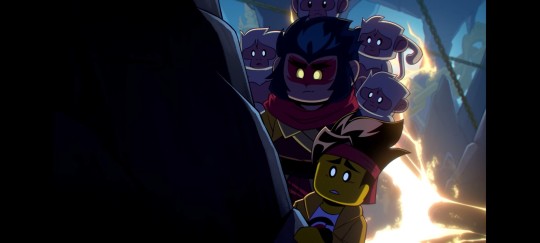
MK : So Monkey King really was the bad guy?
Macaque : That's what I believed, what Azure would have you believe.
That's a really interesting bit, because Macaque uses past tense. He admits that the image of Wukong he has been fueling, of him being the bad guy, is not necessarily true, and puts himself, or his past self, on the same level as Azure which is the season’s villain.
Then Macaque mentions the pilgrims and how they changed Wukong, taking him to a different path, but when MK mentions that this path was the path of “good guys”, Macaque answer with this :
Macaque : every choice has consequences, for someone.
First, while admitting that Wukong is not necessarily a bad guy, Macaque also doesn't admit that he's a good guy.
Second, this is a hint to what happened between them. We know they had another fight after the one under the mountain. One when Wukong was on his pilgrimage. Macaque talks about consequences. We can speculate that the “someone” he mentions while talking about consequences is himself. Thus, maybe, he's saying that by choosing the path of the pilgrims, Wukong forsake Macaque in a way we don't know yet.
We have different hypotheses we can make as to what truly happened and the reason they fought. I personally have three different hypotheses :
First, like on JTTW, Macaque attacked the pilgrims (maybe to “save” Wukong from the circlet). Even if he's the one who ended their friendship by walking away from the mountain and crushing the peach, it's still difficult to sever all links with someone who has been such a great presence and source of happiness in your life. Macaque could have easily heard Wukong's suffering.
Second (very similarly to the first hypothesis) maybe Macaque attacked the pilgrims but this time in a bout of jealousy. He saw how the pilgrims were able to change Wukong while he couldn't and felt replaced.
Third, maybe Macaque didn't attack the pilgrims. Maybe after he severed his friendship with Wukong he felt lost and spiraled out of control. Going on in the path of destruction. And Wukong, as a pilgrim, was sent to stop him. Cue the fight and Macaque's inevitable death.
Before season 5, I was more tempted to believe that my first two hypotheses were more likely due to their likeness with JTTW. But after season 5, I'm actually leaning on the third. During the short extract we have of their fight, Macaque sounds particularly unhinged, further proving that maybe he was really out of control at the time. Furthermore, after the ending of season 5, Macaque is more or less linked to chaos.
In this scene Macaque says : “Wukong was on a path of self-destruction, we all were.”, what's important here is that Macaque puts himself (and the brotherhood) on this path of self-destruction. He also emphasizes how the pilgrims, in particular the monk, was the reason Wukong deviated from this path.
But contrary to Wukong, Macaque had no-one to help him deviate from this path. It's not far-fetched to think Macaque spiraled out of control after the loss of his friendship with Wukong, going further in the path of self-destruction, until chaos engulfed him. And then Wukong was sent to fight him, to stop him.
Anyway, let's leave the hypotheses aside and go back to the study.
I think it's kinda hilarious that Macaque truly does sniff Wukong out, 😂.
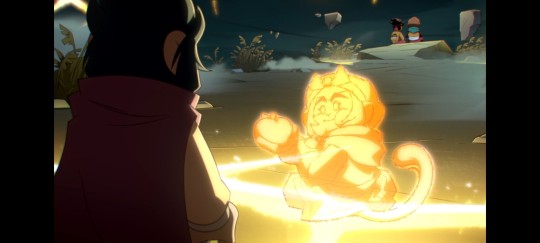
After this, they find Wukong before a cliff with fragments of memories. Wukong admits that he blinded himself with his desire, saying “I just wanted to protect the people I cared about.” with this particular shot, of him handing a peach to Macaque, does emphasize that Macaque is part of the people Wukong cares about. Again, here we have the peach gifting as a symbol of their friendship. And what is even more important is that Macaque steps forward and reaches for the peach before his past self comes along to take it and sit beside Wukong. It shows how Macaque still cares for this friendship with Wukong, he still wants it.
Then, as Macaque gazes at his past self with past Wukong, he reaches for them before letting his hand fall down.
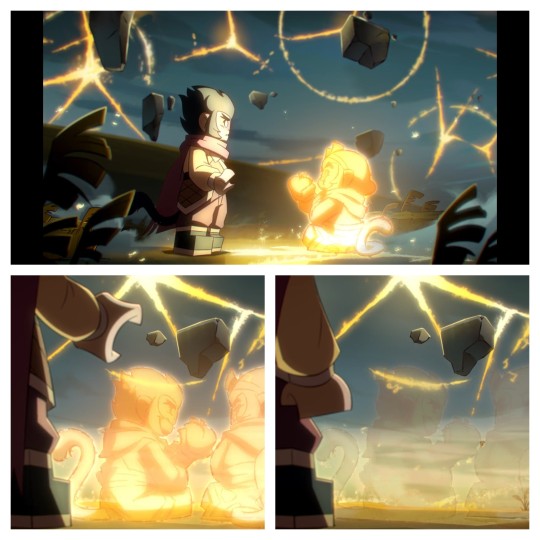
Really, it does show Macaque still yearns for this friendship, but ultimately he gives up. Maybe because of all the bad-blood between them, or maybe because he doesn't feel ready for this yet. No matter, this shows that Macaque doesn't just have hatred towards Wukong. He already admitted that his image of Wukong wasn't entirely true, and then here he shows traces of yearning. In any bruised relationship, the first ever step towards healing is the wants to heal, the wants to even have a relationship, and here Macaque showcases it.
I think it's important that the moment MK begins to talk about “fixing”, Macaque comes and Wukong gazes at him. Maybe it's a sign that Wukong also wants to fix whatever is between them.
MK : I need you to be the Monkey King.
The first thing Wukong does after MK says this is to look at Macaque. And it's only after Macaque smiles at him that Wukong nods and rises. It's very lil, but it's a sign of acceptance on Macaque's side, and a show of care on Wukong's. If Wukong truly didn't care about Macaque anymore he wouldn't search for his acceptance like that. Moreover, Wukong is silently asking Macaque if it's okay to be the Monkey King, to be the hero, to be what essentially killed Macaque, and Macaque smiles and encourages him to be this hero. On Macaque's part, this is a huge step forward. He hates Wukong as a hero because, for him and for a long time, he believed it was what led to their downfall. But here, he encourages Wukong to be one.
The Macaque from season 2 who did a whole shadowplay on how awful heroes are would never do this.
This is really a huge character development for Macaque. It does show how his view of Wukong is changing and how, progressively, he's letting go of his assumptions and hatred, of the fake images he created of Wukong.
After this, we get another flashback of the brotherhood. And if we didn't understand how much Macaque didn't fit with this group before, it's even more obvious now.
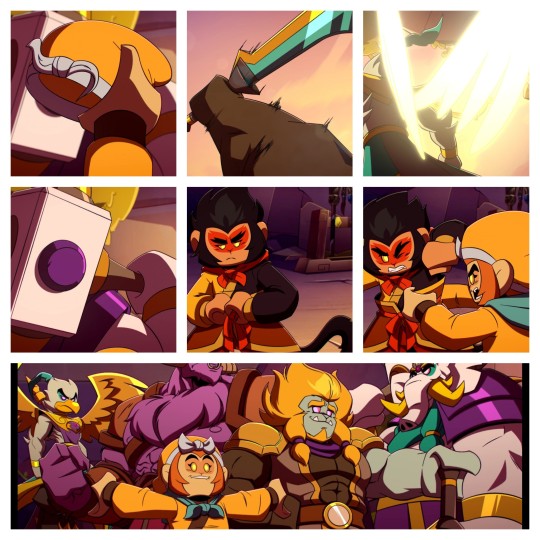
In this scene, all the members of the brotherhood are preparing to fight, there are beautiful and dramatic shots of their clothes and weapons to emphasizes this. All shots are very dynamic. And then we have all the brotherhood standing together looking forward (except Azure who's instead looking at Wukong, probably to showcase how his admiration for Wukong blinded him and made him lose sight of his goal).
Except Macaque isn't in the shot. And the only one who bothers to go to Macaque is Wukong.
Moreover, Macaque clothing shot is static, he looks annoyed, and it's not as dramatic nor as powerful as the others, he's also standing in the back. Frankly he looks like he's dressing himself to go do the groceries. Really, it's a sign that Macaque isn't on the same wavelength, he's not willing to do this, his only link to the others is Wukong who comes to him to help him dress.
All the others are more or less after glory, they act like they're on a grand quest, except Macaque. And even if we don’t get a shot of Bull King clothing himself, he's still standing on the very epic shot of all the members of the brotherhood looking in the distance.
There is a clear dichotomy between Macaque and the others. The others are all depicted in a very epic light, while Macaque is more or less normal.
After this we get back to the present, with the entire team and Nezha in Wukong's shack, while Wukong is explaining their plan. Everyone is here except Macaque. Macaque appears in the shack with a shadow portal. It demonstrates that once again Macaque is helping out of his own volition. Nobody asked him or dragged him in the shack, he went there himself to participate. He could have left after rescuing Wukong, nobody expected him to stay and help considering they didn't drag him with them, but still he decided to stay and actively went into the shack to hear the plan and participate.
But because he's Macaque, he does throw a light insult at Wukong by calling him out on his smell.
After a light training, the fight against the brotherhood begins, and Macaque is put against Peng with Mei.
Peng : I don't know how you stomach it brother, the Six-eared Macaque fighting side by side with his own replacements. Is there anything Wukong could do that would break his hold over you?
First, Peng is tapping into Macaque's insecurities (of him being left behind by Wukong, of him being replaced) while also acknowledging how much obsessed Macaque is with Wukong. Until now, those facts were more or less known to us after observing Macaque, but here another character admits the same thing. That does mean that Macaque’s insecurities, fear and fondness/obsession towards Wukong are canonically noticeable by those who know him.
I love how Macaque answers Peng :
Macaque : You know what, Peng ? Straight up, I've never liked you.
Contrary to the past where Macaque avoided conflicts and prefered to keep silent and not answer Peng's quip, here, he answers, he bites back. Macaque is not the same anymore, he's not as docile, nor as afraid of conflicts. After being killed and resurrected, and fighting Wukong to death multiple times while arguing constantly, he's not afraid of fights anymore. He grew up. He changed from how he was. His experiences forged him.
After Azure's defeat, Peng tries to flee.
Macaque : Mei, let them go. After all, he always was the most cowardly of the bunch.
Oh, how do he turn tables on Peng!!! Macaque using “coward”as an insult when it was what Peng always called Macaque in the past is obviously the greatest roast ever, but it's also a tailored quip made to anger Peng and make him act rash.
We can see Macaque turning around while throwing a fanged smile at Peng, something we haven't seen in a while since season 3.
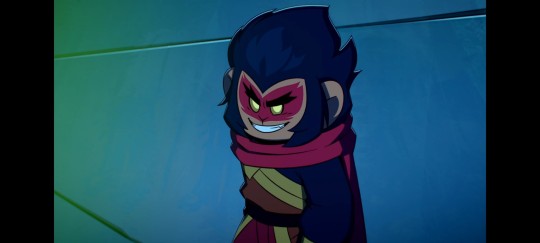
Those shows that Macaque is laying a trap here
The smile is made to provoke Peng, as is the quip. Peng falls for it and rushes towards Macaque, he's then face to face with Macaque kaiju form and Mei's dragon and decides to flee.
Speaking of fanged smiles. The lack of it this season is truly a sign of Macaque comfortability with the group. He doesn't need to pretend anymore.
After that, Macaque participates in the spell used to contain Azure and we get a very confusing short scene of Wukong passing on his cloud next to Macaque, rushing towards Azure to stop him, and Macaque looking at him in slow motion.
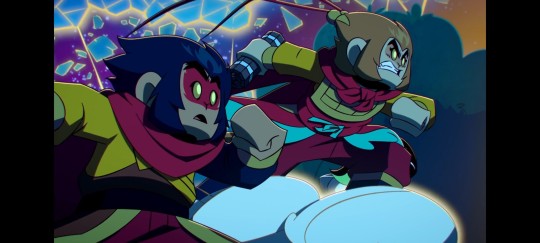
For this, I have no other interpretations but a really romantic coded one. I don't know why there is an emphasis on Macaque looking at Wukong for a second, the scene being in slow motion, except if it's for showing how Macaque's attention is always grabbed by Wukong, even when the threat is ahead. Macaque should look at Azure going on a rampage and focusing on the spell, yet when Wukong passes by him he can't help but look at him. You can have different interpretations for this, of course.
After Azure's defeat, the whole team decided to do a beach party. And Macaque invites himself, of course.
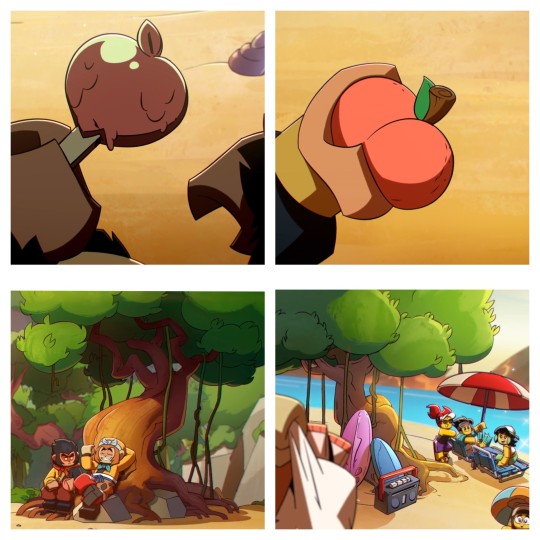
Wukong : yo, kinda blocking out the sun there. Oh it's you.
Macaque : Cute. Thanks for the invite by the way.
Wukong : And thanks for showing up even though you were not invited.
So, first, even though Macaque proved he's definitely not in the bad guy team this season, and even though we saw traces of yearning in both of them, they're still throwing quips at each other. Bad habits break hard. They both are so used to fighting, they probably don't know how to act when they're not. Moreover, all the bad-blood is not entirely gone, they still have quite the troublesome past on their shoulders with untold feelings and festering frustrations.
Second, the tree they're under is the same we saw in the flashbacks, a symbol of their past friendship. Clearly meant here as a sigh of their slow healing process, and the healing of their friendship. Wukong also gives Macaque a peach popsicle, not a coincidence considering peaches are another symbol of their friendship. This could be considered as an olive branch in itself but also as a quiet offer of rekindling, an offer to move forward.
Macaque : You know this is the calm before the storm, right?
Wukong : I know. But that can be a tomorrow problem. Whatever they're scheming, we can handle it.
Wukong furthermore emphasizes this by insisting on the “we”, including Macaque in the good guys team.
Also, Macaque calling Wukong cute? 🤨
But even though in this season Macaque willingly went around to help and defeat the villain, he's still not fully on the good guy team. Once Azure is defeated we can see him stand aside, there is a physical distance between him and the rest that would be furthermore emphasized in season five. I think it's important to notice this because it makes Macaque’s redemption arc more genuine. All his past faults are not magically forgiven, nor does he become buddy-buddy with everyone the moment he turns out good. His redemption is slow. The relationships he forged with the others are tentative at best. Even his healing friendship with Wukong is at its earliest stages.
In this season, we got a clearer view of Macaque as a character and how much he changed compared to his past self, but also how much he's willing to help, how much he truly cares.
Alright, that's it for Macaque in the season 4 specials. I'll do a final post for season 5 and that would be the end of this study.
Like always, if you have any other interpretations it's fine and you can share them, I'm curious about them.
Study S1 / Previous
27 notes
·
View notes
Text
Interpretation/Analysis of Connections between Lan & Yaoshi


Lan - the Aeon of the Hunt
Symbol has a bow (not upright, facing downwards) & arrows
Looks similar to a centaur (like Sagittarius)
Color scheme consists of black, blue, and purple mainly with hints of pink
Yaoshi - the Aeon of the Abundance
Symbol has stalks of wheat
Looks like what a forest spirit might look like
Color scheme consists of green and yellow mostly
Lan & Yaoshi are considered to be enemies & it’s obvious that they’re meant to be opposites of each other almost like foil characters, but it’s interesting how they both complement each other despite their differences
Lan is a destructive Aeon while Yaoshi is considered to be more peaceful, one is followed by death in their wake while the other is followed by life
By setting up this dynamic, it shows the necessity of having both Aeons existing simultaneously
The concepts they represent help curb the other’s more extreme results (for example, Lan’s hyper focus on their revenge pulls in many others who weren’t involved in the destruction of their homeworld, Lan helps create life in light of their violence; Yaoshi on the other hand is an Aeon that can’t allow death or illness as long as they live, which perpetuates immortality, so hunting is what prevents life from going out of control)
They represent the cycle of life & death, which is well-matched by their icons/symbols
A bow and arrows are one of the most common objects to depict a hunter (funny enough when I first saw the symbol, I thought it was supposed to be a deer with antlers but it was only until I noticed the arrows that are more faded in the background that their symbol is actually supposed to be a horizontal bow & arrows 😂 although it’s not supposed to be a deer, it is still good to note that deer are often associated with hunts w/ them being the victims rather than the hunters)
The stalks of wheat that make up Yaoshi’s symbol are often a sign of fertility since grains have been a source of food for many civilizations (farming/agriculture was important for starting out, eventually small groups of people would become civilizations); they can also at times represent resurrection/rebirth since they can grow back as long as there is suitable soil present
Considering the two symbols together, the bow & arrows and the ears of wheat are crucial to the identities that Lan & Yaoshi encompass to the point that they appear in the respective Aeons’ splash art (Lan wields their bow, Yaoshi holds wheat in one of their hands w/ a ring of wheat behind their head); they’re very fitting icons since they’re ancient as well (bows & arrows are one of the oldest forms of weaponry in history, wheat [& grains in general] has been one of the most important sources of food over the course of history)
Another thing to note is the difference between their color themes
Lan’s design utilizes blue & purple which makes them look like they have a nightly aura
Yaoshi’s design uses vibrant green & yellow which makes them look as if they’re part of forests
Now this is just more my own overanalysis but I feel that their color schemes help to establish a connection that presents Lan as the heavens & stars to Yaoshi’s earth
****I didn’t really mean that in shipping terms but I honestly can see it 😂
I love their designs a lot which is why I wanted to look further into their relationship & then I somehow got ideas along the way & fell into a bit of a rabbit hole 😂
****I feel like this thread isn’t finished, I might have to come back to this later; for one thing we’re still in the beginning stages of the game so there’s a lot more that can happen in the future which im very excited for, so I guess this is essentially a WIP (technically I guess all my lore threads are WIPs until the games are done pumping out info about the related topics)
Anyways have my first HSR lore thread ehe
149 notes
·
View notes
Text
I have been thinking fucking incessantly about this one Todd May quote ever since that scene meeting Mystra:
"Why, for the Immortals, are all undertakings in vain? Given an infinite amount of time for existence, everything will happen of its
own accord. There is nothing an immortal being cannot eventually do; and, in fact, nothing he or she will not eventually do."
This is from his book "Death", from the chapter "Death and immortality", about... well, immortality, and the morals of it, as contrasted with its mortal conceptions.
Essentially, in the most straightforward way I can phrase it, May describes how for mortals, life is fraught with urgency. We are always at least tangentially aware of our existence being temporary: which is in part what makes our actions meaningful. We are aware that there is a finite amount of things that we are able to accomplish in our lifetimes, and we are at least kind of aware of our existence being singular in time (even considering religious beliefs of things like reincarnation or an eternal afterlife, the here and now when I am both this and present is still unique), so the end, or the idea of it, in its way, generates the meaning of the limited number of events within this particular chunk of time.
An immortal, like a goddess, would likely be more of a disinterested spectator of life than an active participant in it. Without the urgency of a time limit to drive them forward, and the precariousness of living to make the future uncertain, a goddess has no real interest in things that happen in the world of mortals. With good turning to bad, and bad turning to good over the centuries, it's easy enough to kind of stop caring about what is currently going on, because, well, it'll eventually be different, and then the same again.
Of fucking course she doesn't care for Gale the way he cares for her: it's impossible for her, which is what he, with his limited, human perspective, is (imo) initially incapable of understanding. In his very short, limited life, there is room for one, maybe two such great loves, but in hers? There is an endless, constant stream of near-faceless people, flowing through and not making a permanent mark, because permanence for an immortal is a word largely devoid of meaning. Bad or good, the guilt/pleasure will always fade, the people will all die and get replaced by a brand new crop of similarly expendable people, and the goddess will still have an infinity of time to go.
Even considering that she was once Mystryl, and that technically this incarnation of her was once mortal, and keeping her brush with a kind of death in mind, the future for Mystra, as she can conceive of it, is an empty, vast expanse of nothing but the certainty that she will live, and she will be present in some way. Even if slain (if I recall correctly how this works in DnD), her essence just kinda returns to the cosmic soup, and eventually, she'll... reform, or be resurrected, or changed as she has been already, or she'll remain as an immaterial fragment, or something. Point is, she is unending, and he is no more than a blip on her radar.
That's why she's so callous about asking him to die, and in turn essentially dooming Faerun: she doesn't care. She can't care. He was going to die anyway in what feels to her like the blink of an eye (whether it's 5 days, 50 years, or 500, it's not important), and what does she care if the Grand Design comes to fruition? Whether there are people or mind flayers inhabiting the world, it's of no real concern to her. Eventually, either people will strike back, or go extinct, or the mind flayers will cease to exist and something different will come from it, all without truly affecting her. In a year, a hundred years, or a million years, she will be here, and there will be another bright mageling to amuse her.
Fun as it is to joke about it, I don't think that the toxicity of their relationship is her fault, strictly speaking. It's not the ocean's fault when a tsunami destroys a village and kills hundreds. It's not the storm's fault when lightning strikes and kills a tree. Her very nature is this nebulous, capricious existence, only truly occupied with having the power to indulge her whimsies, and filling an infinite amount of time with things to do- unconcerned about how that affects others, because their whole lives barely affect her for a short segment of her eternal soup of undefined presence.
It can be argued that any relationship that may exist between mortal and immortal is necessarily tragic, toxic, desperately unequal, and grossly unhealthy for the mortal. By its very nature, such a relationship pushes the needs and feelings of the mortal party into essential inconsequence to their partner. There can be no regret to feel when the mortal is hurt or gone, because there have been others like them, and there will be others to come still, and everything will happen, or has happened, and will happen again.
Gale was always doomed to be her devoted plaything, only to be discarded once he stops being fun. That could have been once his appearance stopped pleasing her, or once his wit stopped entertaining her, or for any reason whatsoever, and him recognizing that this relationship was never anything more than entertainment to her, while it was devastating and singularly defining to him, is such an important thing for his future happiness.
(This is mainly why his throwaway "Let me make myself indispensable" line is so important to me, tbh. He yearns to matter, and that is only possible if he either finds contentment entirely within the mortal realm, or becomes a god himself, which in turn just dooms him to essentially become Mystra and continue this vicious cycle.)
(Fucking tragic-ass low-wis wizard man, making me fkin... re-read my philosophy books. Honestly the gall, Larian.)
#mystra#bg3 mystra#gale dekarios#gale of waterdeep#bg3 gale#baldur's gate 3#what else uh#i'm not tagging philosophy because that's fucking pretentious as hell#and that's coming from someone who just unironically used the phrases “capricious existence”#and “the precariousness of living”#AFTER quoting Todd May#don't worry I hate that I am like this too#squirrel plays bg3
65 notes
·
View notes
Note
Since yesterday we talked about my *favorite* story: I think what really confuses me about the NFCV fans who defend Hector's writing by praising his final action, letting Lenore go, as the rightful conclusion of his character arc... is that it only works if you completely memory hole S3.
Hector is introduced as someone who burned his own parents alive after a childhood of abuse, bitter enough to believe humanity needed to be culled. From this perspective, him learning to forgive Lenore, or at least granting her mercy and dignity, could be a good character development. But Hector through the show was not written to be bitter, vengeful and violent: that was Isaac.
Or alternatively, Hector's biggest flaw is that he needs to be loved, so much that his favorite spell is reanimating dead animals so that they could love him unconditionally. He forces those creatures to him. He keeps this behavior by clinging to Dracula, then Carmilla (he could have ran away, he chose to stay with her after Dracula's death), then Lenore (after Carmilla's death and Isaac making him live, Lenore became his only certainty in life). From this perspective, him not forcing Lenore to live an existence she didn't want to live, but accepting her decision, could be poignant. But Hector never actively sought anyone: he was swayed and lured in. Besides, his pets stopped being relevant after S2.
Hector's arc was one of passivity. You can't miss it: even Isaac points out that Hector lacked agency. Hector spent his entire arc being thrown around left and right, lied to, beaten, humiliated, dehumanized, and he simply... existed. He has no objective, he barely has any negative emotions. Hector in S3 was a blow up doll, and we audience were meant to laugh at his stupidity while jerking off over the submissive and breedable peggable guy being called "good boy". S4 pretends he grew, with his working behind the scenes to resurrect Dracula, but it's not enough, for all the reasons we know. That's why him letting Lenore go feels like the last spit in the face for him: not only Hector is the only character in the season who is left with a bittersweet ending at best, but... he didn't do anything to affirm himself. He didn't choose to leave Lenore: Lenore chose to leave him, and he simply nodded to that. He didn't talk to her about their problematic relationship, now that nothing was between them. He didn't take the chance to recognize his own self-worth in the same way Isaac did. We don't know what he plans to do with Isaac, we don't know if he plans to leave the castle at some point. The pattern of him going "sure why not" at everything thrown at him was not shaken.
(I don't need to tell you that as someone who loves the original Hector's story precisely for the way he seizes agency for himself, this pisses me off something fierce. More idealistic? Maybe, but also encouraging.)
I'll be honest: Hector as a character is so empty that I feel his fans simply project themselves into him, especially victims of abuse who see the way he crawled back to Lenore and think that it was an intentionally nuanced representation of the way abuse twists your mind and priorities. And if his story resonates with you, I can't take it away from you, but I can assure you that the guy who spent a whole episode writing his puppy fetish for no reason other than fanservice does not give a single shit about the realism of abuse, let alone the things he was accused of.
And I wonder if the same can be applied to other aspects of the show, like Trephacard's friendship that straight up doesn't exist on screen, or Isaac's "development" which might resonate with people similar to him. Just a lot of projecting and filling in the holes, of which the show has plenty because it would rather waste its time with pointless filibustering and people being mean and crass to each other or piss jokes.
This is gonna sound very cynical but the main reason for the show's success is, essentially, that it's superficially deep and insightful.
Superficial presentation can go a very, very long way in hiding very egregious writing flaws, stuff like great fight scenes, emotional music and dialogues that sounds very cool, philosophical and deep can easily convince people that what they're watching is far more than it really is. These are cases where, if you don't pay attention to the finer details, you would really be led to believe that it's exactly what the show is presenting itself as
As another example: Sonic fans, even after all of these years, still like to parade Mephiles around as the best written villain in the series, even though his plan makes less than zero sense. This is because he looks cool (?), has cool powers, has a cool voice and the game consistently presents him as a mastermind...so folks fall for it, it's all about the vibes and how they emotionally impact the viewers, who in turn don't tackle the material with actual critical thought. Some seem to do so, given the plethora of in-depth analysis of characters like Isaac, but, and I know this is really offensive of me to say, I think they are still being influenced by the emotional impact of the way the story likes to present itself, preventing them from truly being 100% objective
People see Hector's pseudo philosophical speech to Lenore, they see her killing herself with the beautiful cinematography and music, and they mistake it for actual art, because it makes them forget or reinterpret the likes of S3. The reason why so many undermine or even justify Lenore's treatment of Hector in S3 is not, I believe, out of genuine rape apologism, but rather becaus people have a subconscious need to have everything neatly fit into their view of events
The ending of S4 looks so beautiful and deep and meaningful, but their relationship in S3 is in direct contradiction of that, so instead of recognizing that they twist the facts in their own head in order for all of it to make sense, because if you admit the existence of S3 as it truly was to yourself, then S4 and it's "beautiful" emotional impact falls apart like a ton of bricks
This is sounding very arrogant if not downright misanthropic I know, as I'm essentially saying that people don't know how to consume the media they like and that they don't even truly know what it is that they like. I feel a bit ashamed in saying this because it's the type of reasoning that would anger me usually, especially if directed at me, so in a way I guess I'm being hypocritical...but I truly don't see any other way to explain this phenomenon
Isaac is, of course, another good example: it's "easy" for most people to forget his hypocrisy because the show puts such a laser focus on his "development" and emotions and philosophy etc. It's like dangling keys in front of a toddler in order to distract them from some other thing
Something like Other M could have had the same effect, but the difference I feel is that Other M is far more egregious in its superficial dialogue: Samus sounds boring and stupid even at a surface level, she can't fool the audience, and Adam's character doesn't feature nowhere close as many "distractions" from his shitty behavior, especially since the authorization mechanic is pervasive throughout the whole game, so people immediately see what a douchebag he is and how self contradicting the story is about him.
18 notes
·
View notes
Text
the champions shouldn't come back
I’ve been seeing a lot of people say that the Champions should come back to life in TOTK, and can I just say please no. This isn’t even about shipping, I don’t give a fuck about that right now, this is about narrative.
Breath of the Wild is a story about grief. Hyrule is a grave and each ruin is a tomb. Zelda is holding the Calamity back from adding to the body count and Link is the only one who can help her stop him for good. To do that, he needs to help the kingdom move on from its death a hundred years ago. He needs to free the Champions’ spirits from the Divine Beasts and destroy Ganon and save Zelda.
Based on how the map is laid out once you get the Sheikah Slate repaired, Vah Ruta is first. It’s closes to Kakariko/Hateno and the enemies are the easiest. The game tries to subtly funnel you in that direction with the random Zora laid out in the area, searching for Hylians for Prince Sidon, and there’s a reason for that, narratively.
(or there isn’t and I’m reaching, but bear with me)
Mipha was Link’s childhood friend. She (and Zora’s Domain as a location) is the representation of his youth and the child he was before he pulled the Master Sword. She’s his innocence, ripped away by the sword a hundred years ago and handed back to him by the Shrine of Resurrection a hundred years later, even though he doesn’t remember. It’s how he rediscovers his lost innocence, through Muzu being pissed at him and Sidon hiding his sadness, an innocence which he loses again once he frees Mipha’s spirit from Vah Ruta.
She tells him, “Yesterday, I was awash in a pool of tears. I had nearly given up hope and resigned myself to being trapped here, as a spirit, for the rest of eternity. But now you’re here”. In this moment Link faces the reality of what the Champions being dead means. He’s been told by everyone that they’re prisoners, unable to move on, but now he’s seeing it for the first time, hearing in Mipha’s voice the pain of what these hundred years have been. He knows now that he really is the light, our light, that must shine upon Hyrule once again and that if he wants to remember more, he needs to go free the next Divine Beast.
In freeing Mipha, Link gets hope in the form of her Grace.
The game tries to funnel you to Vah Rudania next. There’s a very easy path from the Domain to Death Mountain, with the stable where you get the heatproof elixirs close by. Goron City is the Okay, I know what’s really going on, now what? of the game. Daruk was Link’s rock (pun not intended but it’s true), a grounding presence, the person that keeps him himself once he’s saddled with the burden of being the Hero of Hyrule.
He calls Link to Death Mountain in the memories to show off his progress with Rudania, yeah, but also to have, like, guy talk. He mentions “all those delectable rocks” and then reminds Link that he’s not alone in protecting Hyrule, that, “I’ll protect this land of ours to the death!”. He’s reassuring Link that he’s got his back and then literally does when those rocks fall and he uses his Protection.
Daruk gives him that Protection once he’s freed from Rudania, that encouraging smack on the back that says, Go get him for us.
Then there’s Revali and Vah Medoh. Revali was a jerk to Link, and sure he’s jealous that Link is The Hero, that the Master Sword is arguably the most important piece of the “killing the Calamity” plan, and that all he’s going to be is glorified backup, but the point of Revali is that he keeps Link on the ball.
By that, I mean that Link’s little rivalry with Revali (whether or not he actually sees their relationship as such) is akin to, like, a sports team. There’s always that one person you don’t necessarily get along with, but you know you can count on them to push you to be your best and be there to pick up the slack whenever you stumble. Rito Village is home to Teba’s pride and the spirit of Revali’s arrogance lives within his landing, and Link is able to remember that one time Revali made fun of him for not being able to fly, how that eggs him on to find a way up to Vah Medoh in the present just to rub it in the archer’s face (at least, that's how I felt when I first played the game). There’s a method to Revali’s madness and it’s to make sure Link is in tip-top shape if he’s supposed to be the one to save the world.
Revali then literally uplifts Link with his Gale after he has control of Medoh again.
Finally, we have Urbosa. Like Daruk, she was a reassuring presence, but not in the sense of, I’m your shield, I’ll be watching your back. She’s comforting in the way having five 100+ damage Lynel weapons in your inventory is comforting. She’s reassuring in the sense of, I’m your sword, I’ll be next to you on the front lines. She reminds Link that despite his youth and the burden of the sword on his spine, that he has a duty to protect Zelda, and that by protecting Zelda he is protecting Hyrule.
She’s not forcing him into the role, but she’s keeping him on track whereas Daruk allows him to stray for the sake of his mental health/childhood. She’s saying, Be a child for as long as you can, but also be the Hero. It’s why she tells him to open up to Zelda, so he can have a friend his age that he can be around 24/7, so he can have someone to relate to (and so that Zelda can, too). Urbosa is the representation of Link’s duty and his relationship with Zelda (whether platonic or romantic, I don’t care in this context), and how that relationship with Zelda turns into Zelda finally unlocking her powers on Blatchery Plain. Without Urbosa’s presence, Link isn’t in the right headspace to even be the Hero.
Now that Link knows exactly what he’s lost a hundred years ago, and what he’s then regained during his quest, he can take her Fury and use it as a conduit for his own.
Link starts Breath of the Wild a blank slate tasked with saving the world. Throughout his quest, he remembers his lost childhood, but regains that little spark of hope, that thought of, I can do this. He remembers that he wasn’t alone in his task, that there were other people right there with him, and that it was the actions of a monster that took them all away from him, not the unheard prayers of the princess he was sworn to protect and then came to genuinely care for. He learns that there’s nothing he can do to change the past, that all he can do is let his dead friends move on and do his best to do the same.
It’s why he takes their weapons. It’s why he buys the house in Hateno. It’s why he furnishes it. It’s why he builds Tarrey Town. He accepts that his old friends are gone and that the best thing he can do for them is make new ones with the people who helped him free them. In dealing with his past, in accepting it, Link sets up his future for after the dust settles.
TLDR: To bring the Champions back to life in Tears of the Kingdom is to ignore all of the progress we as players made in Breath of the Wild, it ignores the point of the story the game is telling, and it does a disservice to the character arc that Link has over the course of the game.
#breath of the wild#botw#tears of the kingdom#totk#I JUST LOVE THIS GAME A LOT OKAY#I have so many feelings about the themes of it#I wrote this in a fit of madness#link#zelda#mipha#urbosa#revali#daruk#botw meta#breath of the wild meta
399 notes
·
View notes
Text
Rebels Rewatch: "The Holocrons of Fate"
In which things get Force Weird and Maul is the actual worst.
Full disclaimer in the name of honesty, I still think Maul's "resurrection" in TCW was stupid. It will never not be stupid.
That being said, I'm glad they decided, "Well, let's actually do something interesting with him." once they had him.
Making him into a Sisyphean/Tantalus-figure--always reaching, never grasping--adds a layer of depth and tragedy to him. No matter how hard he tries, Maul will never gain what he seeks. When it's within his grasp, he will inevitably self-sabotage or have it slip away from him.
We meet him at a time in his life when he's just lost everything, again. He finds new purpose and motivation in the form of Ezra Bridger figuratively falling into his lap--here's someone to carry on his legacy, that he can mold and teach--but in his eagerness to have him, he irreparably damages any chance the boy would have had to learn from him willingly.
But like Sisyphus pushing at that rock, like Tantalus reaching for the grapes above him, he cannot stop trying.
Probably fitting that his question to the holocrons is an answer to the inevitable existential dread of his own existence.
But I'm getting waaaaaay ahead of myself, he hasn't even shown his ugly face yet.
Instead we drop in on Kanan and Ezra, on a CR90, presumably coming back from a mission they headed up. Ezra's asking after the holocron again, still not quite over his obsessive addiction to it, still hyper-focusing on it as the only good thing that could have possibly come out of the mess at Malachor.
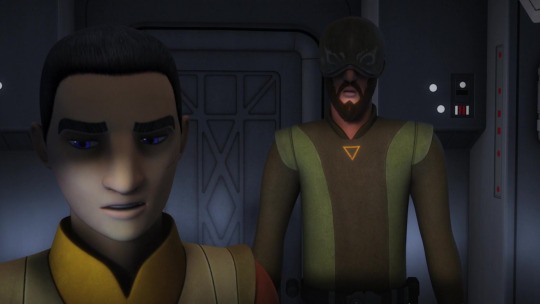
"But if not to get the Sith holocron, why did Master Yoda send us to Malachor?" That's a good question. *stares at writers*
Kanan offers up the idea that is was for "a chance to destroy the Sith." Sure we'll go with that.
Their conversation is interrupted by them coming to their destination, a rendezvous point with another Rebel ship.
Thaaaaaaaaaat Maul has almost completely murderized. This scene is one of the ones that does a really good job subtly showing off Kanan's blindness. Ezra offers commentary for Kanan's benefit throughout, Kanan has a hand out to feel, he mentions the carbon scoring smell and inclines his ear towards the sounds coming from behind a door.
The only survivor can only gasp out about a "red blade... after you." ("you" being very specifically Ezra) and that the Ghost was in danger.
Right so I'd just like to emphasize, for the fandom's sake, Maul murdered an entire Rebel ship looking for Ezra.
Kanan and Ezra assume, naturally, that "red blade" means there's a new Inquisitor after them and rush to contact the Ghost. Whereupon they discover that it's Maul who's threatening them now.
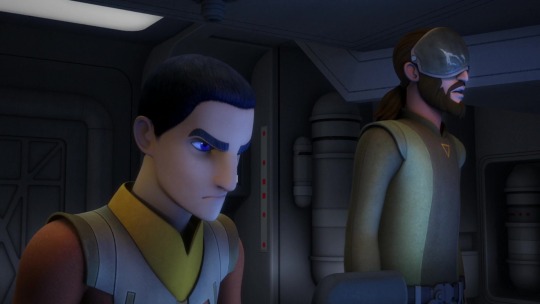
And ooooooh Ezra's piiiiiiiiissed.
"No... I betrayed your friends, but I would have remained loyal to you." *rubs eyes* That's... There's not a significant emotional distinction there for Ezra, you know that right, Maul? Of course you don't.
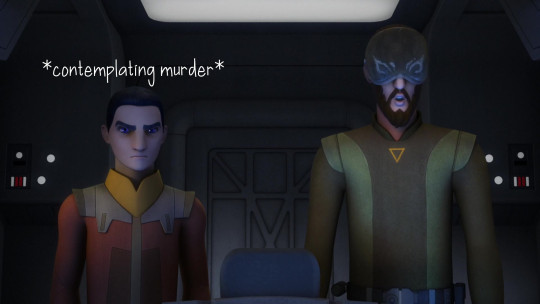
Back when fandom was Absolutely Certain that Maul was going to successfully abduct Ezra in "Twilight of the Apprentice" there were theories flying around that Sabine would have to ply her Mandalorian connections in order to get information about where he might be hiding, since we knew by then her family had ties to Death Watch. Things didn't happen that way, obviously, but it was still nice to get a nod towards that connection.
Maul proceeds to be the world's worst houseguest, forcing Hera to take him on a "tour" of the ship while he comments snarkily about each room.
Like you have room to talk mister Lived In Literal Garbage For Years.
Anyway this tour seems to be mostly a ruse to look for Kanan's holocron, and Maul very creepily and uncomfortably pulls the information out of Hera's head. (Possibly along with Kanan's real name??? It was never actually elaborated on how Maul knows "Caleb Dume", but it would make the most sense he skimmed it from Hera, to throw her defenses off guard for his stronger mind probe.)
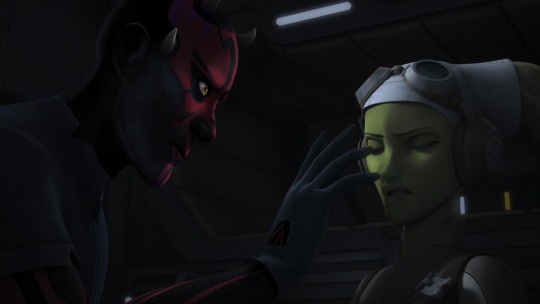
You leave mom alone you cockroach.
I know this is serious but boy I would have LOVED to hear the conversation Kanan and Ezra must have had with Sato when they got back.
"Hey we need to borrow a speeder to go out into the desert past the sensor beacon fence where all the spiders are to visit a giant weird Force Moose and retrieve a Sith Soul Jar because a creepy spike-horned Dark Side nutcase kidnapped everyone else on our crew."
I'm just picturing Sato throwing up his hands all, "Just take whatever you need."
Also amusing: the idea of Ezra trying to describe the Bendu to Kanan later.
I absolutely dig this idea of holocrons creating a Force Convergence powerful enough to grant visions. I'm always in favor of Jedi artifacts being just a little bit weird with the Force. I mean, kyber crystals sing and hum to Jedi, lightsabers are a living extension of the Force moving through them, their temples carry thousands of years of emotions and feelings sticking to the walls, why shouldn't their holocrons be able to join with Sith holocrons to make an oracle?
The Bendu says he's neutral but he's also clearly set up this little test in order to help heal the rift between Kanan and Ezra (and he gives a fond little smile when he can sense their reconciliation).
"Why take his weapon?" "He's got to learn to solve problems without it." *WEEPS IN FINALE FEELINGS REMEMBERING THAT EZRA LEFT HIS LIGHTSABER BEHIND AND RELIED ONLY ON HIS UNIQUE FORCE ABILITY TO CONNECT IN ORDER TO SAVE EVERYONE*
Lol @ Maul trying to blunt force the Jedi holocron open. My dude. My guy. You were the one to point out that Sith holocrons can only be opened by a Sith or one who thinks like them. Follows that Jedi holocrons might operate on the same principle? Maybe?
Not sure what the point is of getting to the engine room quietly given the racket y'all made literally a second ago.
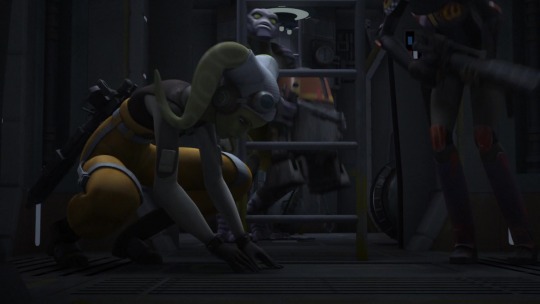
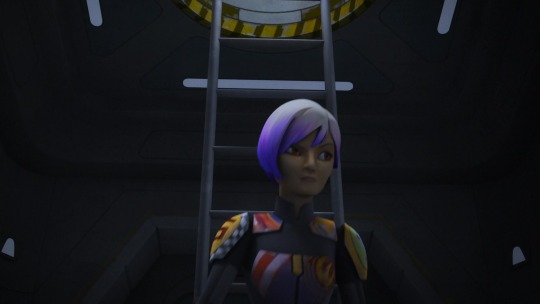
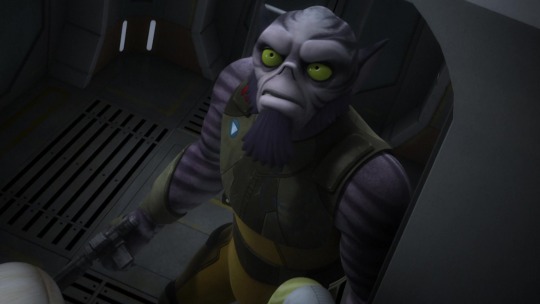
This is actually a new part of the ship we haven't seen before now. It's accessed both by a grate in the floor under the main central ladder and the door at the very back of the cargo hold.
And this is a really clever idea with magnetizing the hold, remembering that Maul's legs are metal. They almost pull off their own rescue here.
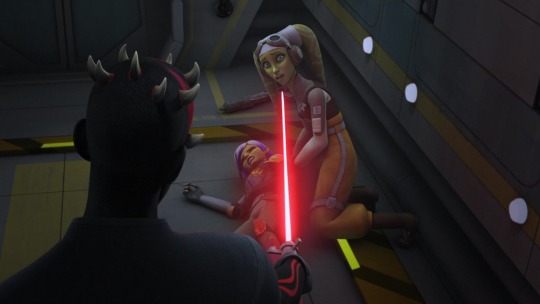
Bastard.
Sans his lightsaber, Ezra reaches for his blaster holster instead. Except I think that's empty too, I looked but I didn't see it equipped.
Kanan senses his panic and distress from outside and follows in. This scene reminds me a little bit of when Vision!Kanan showed up in "Path of the Jedi". Not sure why, just kind of does.
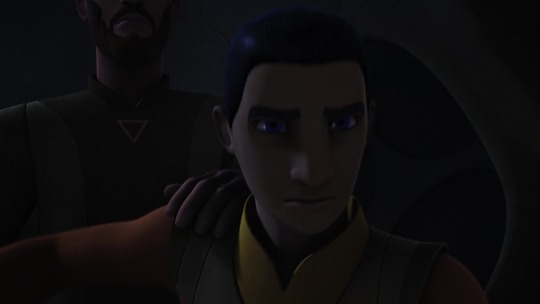
Ezra instinctively moves to shield Kanan from the krykna, aww.
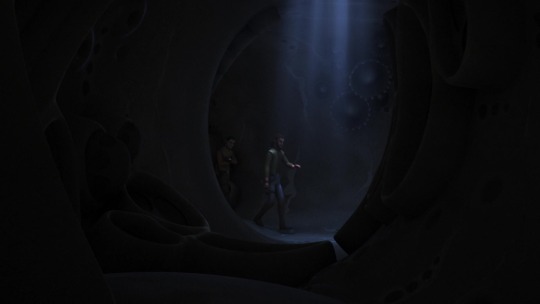
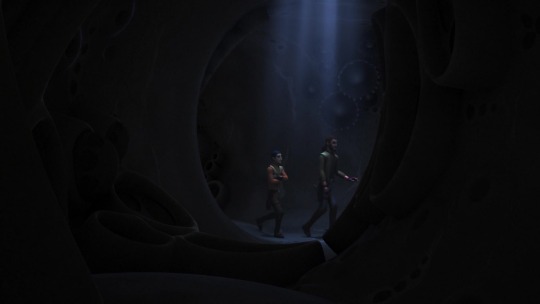
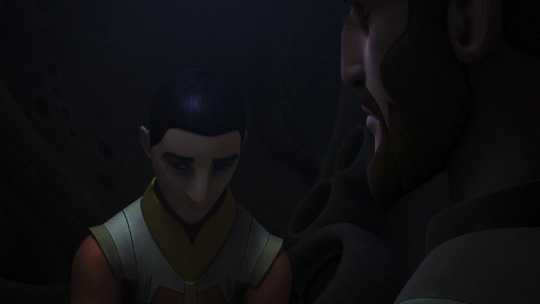
Ugh this return to that timid, self-protective pose. :( We haven't seen Ezra shield himself like that in ages and it makes him look so much smaller.
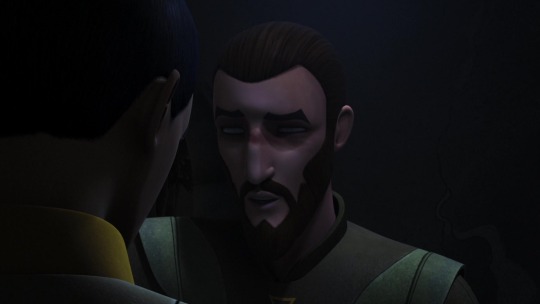
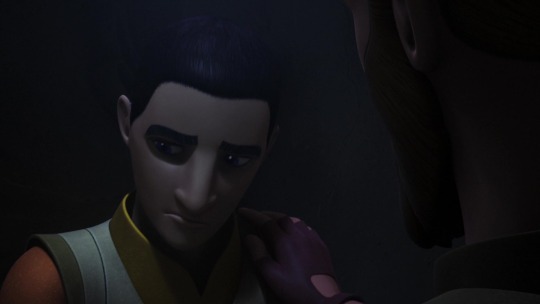
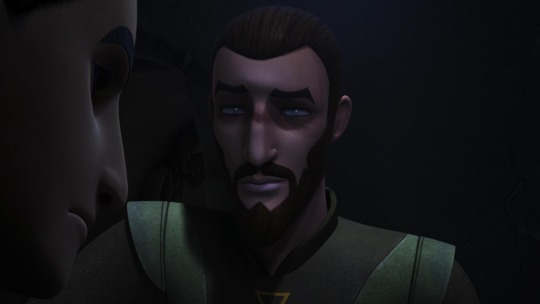
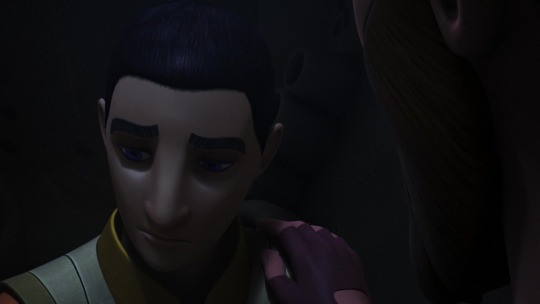
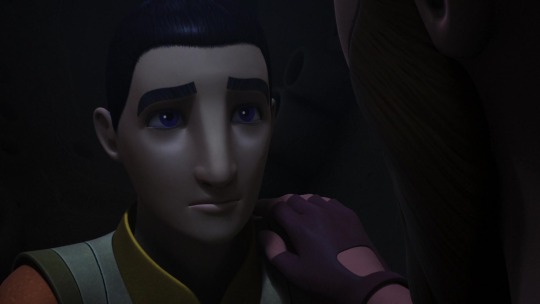
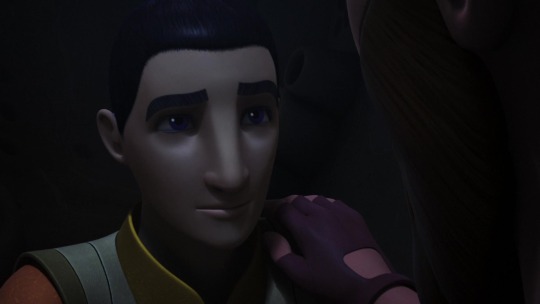
Kanan tells Ezra everything Ezra's been desperate to hear for six months:
It wasn't your fault.
I never blamed you.
Forgive yourself.
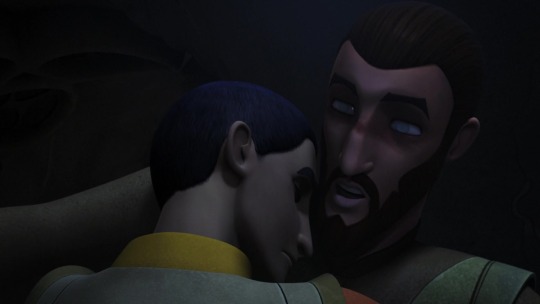
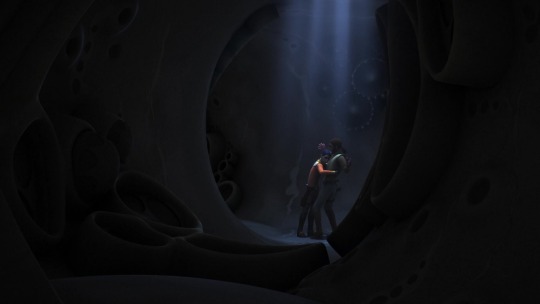
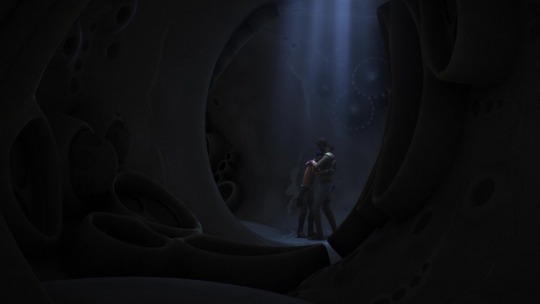
<333333333
Haven't talked about the music much but this is a nice rendition of Ezra's theme here for this heartwarming moment.
Ah noooooope I like the krykna EVEN LESS now, wtf is this it's creepy.
Ezra nervous little glances as the krykna uncurl. <3
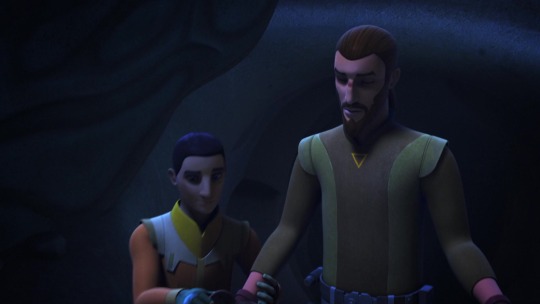
Ezra passing Kanan's mask into his hand. <3
Bendu's "Once a secret is known, it cannot be unknown." was a lot more ominous in the trailers, ngl.
Kanan showing a remarkable amount of trust in Ezra, leaving the decision on whether to open up the Sith holocron or not up to him. Ezra looks trepidaciously at it a moment and then decides not to, passing it back to Kanan.
(And then he never touched the Dark Side again lol.)
I can't even be mad that Ezra got the first blind joke in. At least he beat Maul to the punch.
Hhggngnghhh I hate him so much this rat bastard trash man. He immediately takes advantage of Kanan's blindness to lead him to an airlock and tries to space him.
EZRA WASN'T EVEN OUT OF SIGHT LONGER THAN A MINUTE OR TWO, MAUL, CAN YOU NOT?!
You actually can survive the void of space very briefly. You have about 15 seconds before you pass out, possibly more if you exhale first.
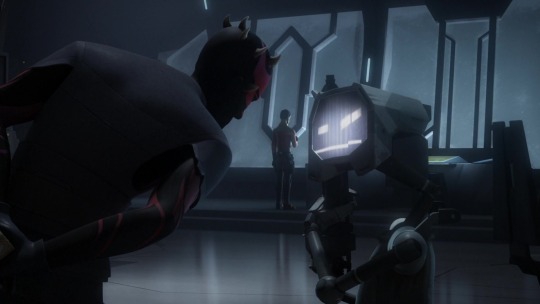
Uggggggggghhhh this scene makes my skin crawl, Maul is literally fresh off his second attempt to murder Kanan and orders the droids to kill the rest and Ezra is standing there completely unaware of the danger he's in or what Maul's done.
Maul bald-face lies to him and tells him his friends are fine. Just imagining the horror of what would have happened if Kanan hadn't made it back inside, how Ezra would have emerged from the holocron vision only to learn the awful truth that Maul had killed everyone he loved, that he was alone, alone with a deranged murderer who had decided he was his apprentice...
*shudder*
As they prepare to join the holocrons, it's interesting to note that Ezra's wish is a bit Dark Side tinted--he wants the answer on how to destroy the Sith--while Maul's is Light--the vaguely described "hope". Hope for what it's not clear at first. Hope for meaning? Hope for purpose? Hope for another chance to fix what he considers the point at which things went wrong? Commentary from behind the scenes has said that Maul's motivation for revenge against Obi-Wan is primarily rooted in his fixation on his failure at Naboo. "If I can just kill this guy, the person who was there when everything went wrong, it will make it all better."
I think, given that Maul had become self-consciously legacy-minded, thinking about the future he planned to create with Ezra at his side, he turned his mind backwards to unfinished business from the past, messes he still had to clean up, in order to move forward.
And that's why he manipulates the holocron vision to show him Obi-Wan's fate.
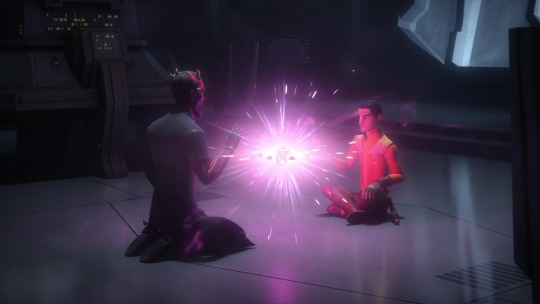
This sequence is really pretty.
The music cue that accompanies this moment is not overly bombastic, but rather sly, mysterious, and eerie, high vocals mingling with strings to create an odd balance.
The resignation on Sabine, Hera, and Zeb's faces when the droids point their weapons. :(
Hera's elation when she hears Kanan there. :D The very worried Spacefamily books it to Ezra of course.
Maul doesn't see anything from the vision at first, "Only oblivion!" he says, because the path he's on can only lead him there and urges Ezra to "Go deeper!" It just occurred to me that he's basically doing what his old master Palpatine would try to do in Season Four--piggybacking off Ezra's connection and using him as a conduit to achieve what he wants. He pushes Ezra to look harder because he can't see anything himself.
The brighter burst of blinding light could have just been an effect of Maul and Ezra sinking deeper into the vision but also I like to think Maul manipulated the convergence to try to keep the others away because it swells up right when we hear Hera calling for Ezra.
This bit is so cool, the Force is so loud and present in the room that Kanan's blindness doesn't matter, he can physically see through it even with his ruined eyes. Hera's voice distorts and fades as if it's coming across a large distance even though Kanan only goes a couple steps away. The orchestra rouses with full strings and chorus. The negative film effect makes Kanan, Ezra, and Maul look like celestial figures of pure energy.
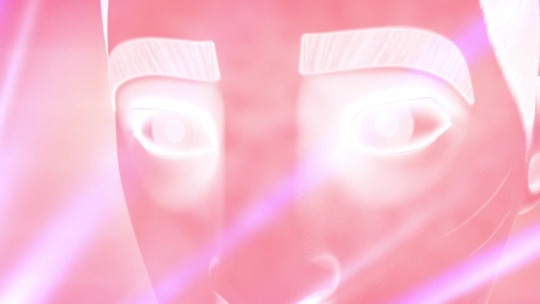
THE WAY THIS IS BOTH (LITERALLY) ABOUT THE TWIN SUNS OF TATOOINE AND (FIGURATIVELY) ABOUT LUKE AND LEIA, THE CHILDREN OF THE CHOSEN ONE AND THE TWO MOST KEY PLAYERS IN THE ULTIMATE DESTRUCTION OF THE SITH.
THE WAY ALL THREE OF THEM--LUKE, LEIA, AND EZRA--ARE NARRATIVE "CHOSEN ONES" WITHOUT BEING THE IN-TEXT CHOSEN ONE, HOW THE FORCE STILL PUTS THEM IN KEY PLACES IN ORDER TO BRING ABOUT THE FULFILLMENT OF THE PROPHECY.
THE PATH TO LIRA SAN WILL BE DECIDED BY THE FATE OF THE THREE.
Ezra ultimately trusts Kanan and looks away just before Maul can discern where, exactly, Obi-Wan is. The severed connection explodes outwards, throwing them all across the room, and the holocrons are shattered.
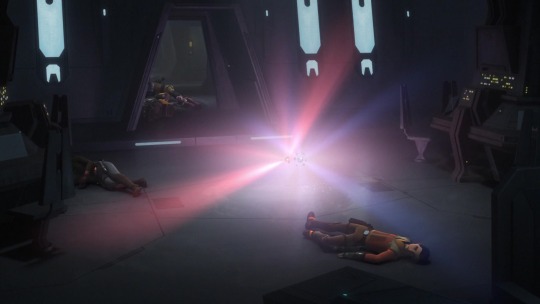
Maul's cackling and crazed body language as he stumbles out to escape make it seem like the knowledge that Obi-Wan's alive has actually driven him insane. It's quite disconcerting.
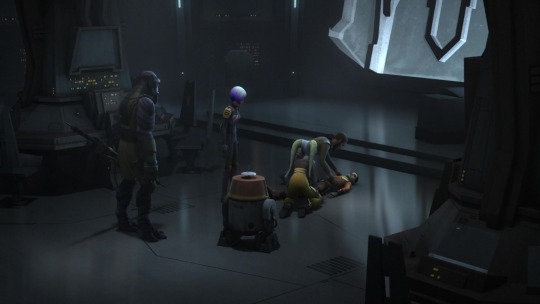
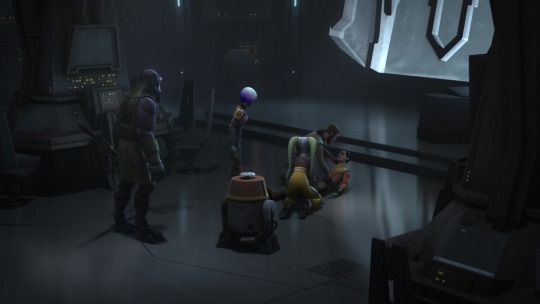
The Spacefamily surrounding Ezra worriedly. <3 You have to wonder if Kanan is fearing a repeat of Ezra's collapse back in "Gathering Forces", if perhaps for a moment he's a bit too still here.
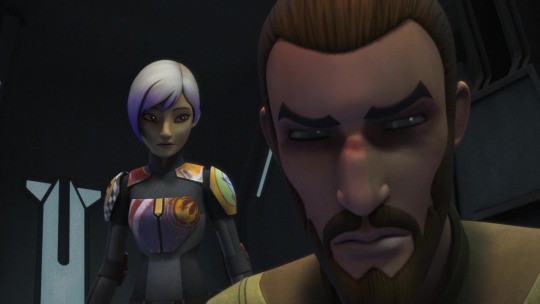
Oh look the two Most Important People in Ezra's life and narrative journey!
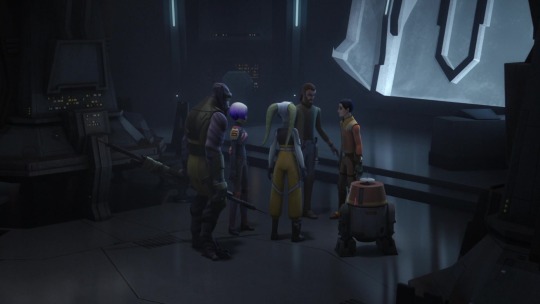
The way Kanan keeps his hand on Ezra's shoulder until the very end. <333333
With a few minor nitpicks (mostly that a few of the mysteries aren't well explained or answered, see Maul's knowledge of Kanan's real name) this is a pretty solid episode, a worthy follow-up to the premiere. We continue to settle Ezra's Dark Side temptations, burying them mostly for good in this episode, though the lingering effects it had on him emotionally will continue well into his characterization, motives, and arc down the line.
Maul is an awful bastard in this and such a good villain. :) He's so much more confident and assured of himself, clear-headed and calculating. 0 for 2 on successfully kidnapping Ezra but his menace will still pervade and influence a lot of Ezra's decisions this season.
I'll talk more about the overall effects and purpose of the holocron arc when we come to its end in "Twin Suns" but for now I'll just enjoy this episode once again, it's great.
#star wars#star wars rebels#ezra bridger#space dad and his precious pumpkin child#rebels rewatch#liveblog#spoilers#maul is once again the actual worst
41 notes
·
View notes
Text
Why Ava Silva is the hero we need
Alright, let’s talk about it. I’ve watched A LOT of television over the years and there’s nothing I love more than genre storytelling. Give me an ass-kicking, self-sacrificing female lead who gives everything and still saves the day. And let’s be honest there’s plenty of shows to choose from: Xena to Buffy to Supergirl to animated girlies like Korra and She-Ra and that trope is available in spades. With great power comes great responsibility and all these characters are constantly trying to serve the greater good despite the cost.
And then there’s Ava Silva. She’s already dead when we first meet her and what’s most tragic of all is that she was never able to properly live. A most likely orphaned quadriplegic who’s abused and then murdered by the nun who was charged with caring for her - it’s about as devastating a backstory as you can get. She never has agency over her life or even her death in fact. She’s revived by chance when her corpse is used to hide the halo. She has no say in any of it. Her initial life is destroyed by the car accident that kills her mom, she’s murdered and can’t even rest in peace before being resurrected to then live a second life in which she’s told she has to fight for the Catholic Church (an institution that has only ever caused her harm) and then discovers that her newly granted role of Warrior Nun means she’ll most likely soon die again. Despite all this though (and because of it really) Ava appreciates life. Truly and fully. In a way that we’ve never really gotten to see before. In fact, she’s even selfish about it! How dare “the chosen one” run away in pursuit of her own happiness above all.
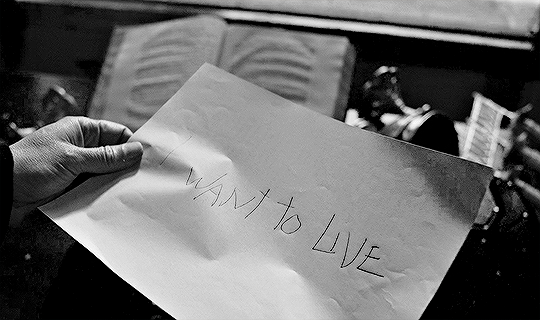
In Ava, I’m reminded most of Buffy and the speech she gives to Giles at the end of the first season when she has to come to terms with her imminent death. She’s only sixteen and has to bear the weight of the world on her shoulders. She just wants to be a normal teenager but instead has to become the Slayer.
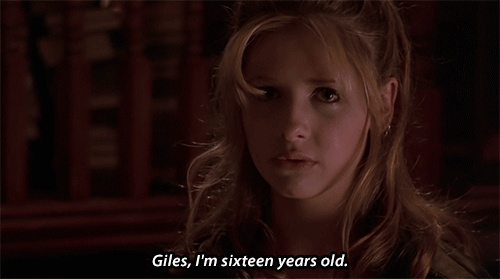
Like Ava, Buffy dies (twice!). She cracks jokes like Ava makes puns and is extremely loyal to her friends/found family. The biggest difference between these two heroines though becomes apparent when in season six Buffy is ripped from the afterlife and has to fight again. Buffy wanting to be dead was such an insane twist. Shouldn’t the hero want to live?
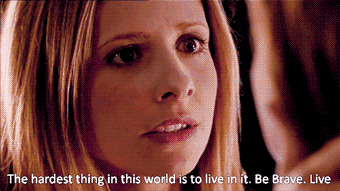
Buffy’s sacrifice is still some of television’s greatest storytelling. The show was originally going to end there before finding life on a different network (say what you will about that) but for the time it was also a powerful choice.
Fast forward twenty years and along comes Warrior Nun. At this point heroes sacrificing themselves has become the norm. They’re supposed to die. Weighted down by the responsibility of life and “the hardest thing in this world is to live in it” feels like the truest of statements. And let’s be honest, life IS hard. But then there’s Ava.

She appreciates what life can offer. She runs, she stuffs her face with food, she dances, she drinks, she loves deeply and learns to appreciate every sunrise. She doesn’t offer any pretenses about the fulfillment of death and through Ava as an audience we’re reminded of how precious and fleeting and affirming life can be. It’s such an incredibly important message because Warrior Nun wholly embraces (and shows us) what it means to live in a way that genre storytelling hasn’t always been able to.
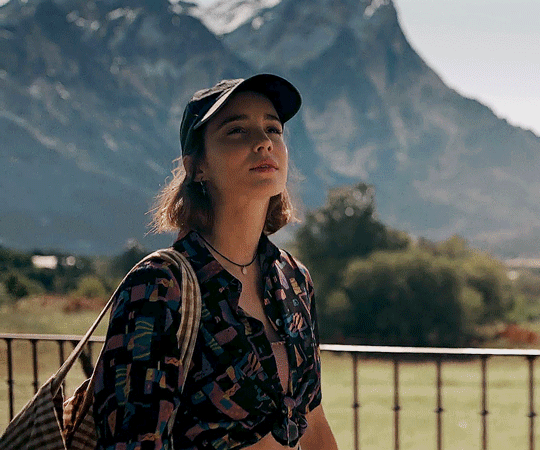
Of course, Ava still has to sacrifice herself. It wouldn’t be a proper end of the world genre show if she didn’t and her journey to making this decision is what makes this show so good (bless Avatrice). Warrior Nun’s cancellation particularly stings because of this. We still need Ava to have her happy ending. At the very least we’re currently left with the semblance of divinium-fueled hope (thank you Simon Barry!). We know Ava comes back - here’s to hoping the show gets to as well.
#warrior nun#save warrior nun#ava silva#alba baptista#buffy#tv: btvs#buffy the vampire slayer#just a bit of analysis so I don't lose my mind#genre tv#I could write a whole book analyzing what the hero's journey looks like in warrior nun#this post barely grazes the surface#also thank you gif makers
133 notes
·
View notes
Text
AHEM. Spoilers below for Harry Potter book 7 and Artemis Fowl book 8. You have been warned.
Another little warning: This is going to be a bit ramble-y. If someone can put this into words better than I can, please do. I may come back and fix this later, but, knowing me… that’s not likely.
I figured out why the Main Character Death tm thing works for Artemis but not for Harry.
Let’s review the similarities between these two, first.
They both know ahead of time that they are getting into something that has a 99.999% chance of killing them.
They both died as a direct result of something The Big Bad did.
They both came back to life as a direct result of something Big Smart Genius Person did.
They both feel that they have no other choice.
(Before we really get into this, I would like to note that I am using both the HP books and movies for this. Since the author worked so closely with the movies, I feel that they are still a viable source of HP lore. I will not, however, be using the AF movie. It is a piece of hot dumpster garbage and I will not be swayed on that.)
So. Why does this Main Character Death tm thing work for Artemis, but not Harry?
For Harry, I always felt that the sacrifice fell flat. He wakes up on the very next page in that weird afterlife-spirity realm with Dumbledore. We KNOW that Wizard Afterlife exists by this. Dumbledore himself confirms it, or at least attempts to. (“Of course it’s all happening in your head, Harry, but why does that mean it’s not real?” yada yada yada) Harry will end up there if he dies. Also, what does he stand to lose by dying? Sure, he loses Ron, Hermione, and all of his friends, but he gains his family back. Even though the Resurrection Stone was likely a sham, we can see by Harry’s reaction that he is genuinely looking forward to seeing James and Lily and Sirius and Remus again.
There are no stakes. Harry wakes back up in the Forbidden Forest, secure in the knowledge that he is going to win. And, frankly, the author (may she rest in peace) set us up for a BIG win. If you’ve been paying attention for the last seven books, you know that Harry’s got this in the bag. It’s obvious from the first chapter. He beats Voldemort as a baby. Why should he NOT survive the Killing Curse a second time?
The other part of Harry’s story that is different from Artemis’s is that he has the knowledge that he is 100% walking into a death trap. He even says (at least in the movie) “I am ready to die”. This is his purpose. He’s fulfilling his last act as The Boy Who Lived. His story is complete, or it would have been had he actually died. The world would truly have been better off with Harry dead, and Harry would have been better for it.
In fact, all of Hogwarts believes he is dead. Neville’s rousing speech in the movie is proof of that.
-
The reason this works for Artemis is that there are still stakes in play. Harry waltzes up to Voldy and basically puts his own head on the chopping block, knowing that it will give the good guys the win they need. We as readers know that he is probably going to live, based on what we know about Harry and the author’s penchant for not killing off Really Important Characters. AND even if he dies, he returns to his family. It’s honestly his best-case scenario at this point.
There are no stakes for Harry.
-
Artemis, however, still has stakes. He’s just barely gotten to live a normal life with his parents and brothers. He has formed a good friendship with Holly and Butler, and he still has so much left to do. (We see this in Atlantis Complex. He has the knowledge, resources, and genius to straight-up fix global warming.) The world would be worse off without Artemis Fowl.
And then he dies.
-
What’s worse is that he has hope.
Harry walks in thinking there’s no way he can walk away from the Killing Curse a second time. He has accepted his death, putting no failsafes in place just in case he may have the option to come back. Artemis walks in thinking that his human DNA could overpower the tiny bit of fairy DNA. He has hope. It’s a slim hope, but he has it. He puts failsafes in place, just in case something does go horribly wrong, in the form of a kiss on Holly’s forehead and keeping the chrysalis operational, as well as a living will. He has accepted the fact that he certainly could die, but he says it himself, “I always thought there would be time for goodbyes.” He’s not ready.
After he seals that will, he thinks, “No going back now.” If anything, he feels trapped in his fate, while Harry accepts his. Directly after that, he nearly throws up. He’s scared as hell. There is, of course, the matter of Artemis’s reaction to Opal’s death: “All this time. All this strife and nobody wins. What a tragedy.” Again, acknowledging the stakes.
He didn’t know what would happen after he put Nopal’s hand in the white handprint. All he knew was that he may die from it, but he didn’t want to. (Yes, he tells Butler not to grab the defibrillator, but Artemis Fowl knows more about magic than most fairies do. He knows he’s screwed. Knowing you’re going to die is not the same as accepting it). There are still stakes in play. He is completely unsure of what he is doing, maybe for the first time in his life.
The other huge difference is that Artemis could still fail. Opal could open the second gate. Harry knows his goal and he knows Voldemort is arrogant enough to go through with killing him. Voldemort is predictable. Opal is… less so.
Finally, Artemis does actually die. There is a six-month period where he is straight-up dead. His parents mourn him. There’s a frickin’ funeral. (Harry has no such period. We know he’s going to come back relatively quickly after he “dies”.)
And yet, his most loyal friend, the man who was like a father to him, doesn’t believe it. Butler doesn’t attend the funeral and he truly believes that Artemis Fowl will come back.
It takes Holly six months to even give Butler that hope, and yet he still clings to nothing. I would wager that Holly believed the same. (e.g. “Yes, well, the barely conceivable is Artemis Fowl’s specialty.) She’s more evidence-driven, however, which makes sense considering she a. got that evidence about a week later and b. kept it to herself and Foaly until she knew they had something to work with. (It was also illegal, to be fair.)
-
Artemis Fowl was not ready to die, AND there were still stakes in play— and that made his death all the more poignant.
#artemis fowl#the last guardian#harry potter#deathly hallows#holly short#voldemort#domovoi butler#hero dies trope
27 notes
·
View notes
Text
Seraph of the End: Vampire Reign (Manga) - written by Takaya Kagami, illustrated by Yamato Yamamoto, storyboarded by Daisuke Furuya (7.5/10)

Synopsis
Genres: Dark fantasy, post apocalyptic, action
After the passing of his abusive parents, eight-year-old Yuuichirou is taken in by the Hyakuya orphanage. Soon after, a pandemic sweeps the world, resulting in the deaths of everybody over the age of 13. To make things worse, vampires swarm in and turn the children of the Hyakuya orphanage into livestock.
Eight years later, Yuu aspires to kill the vampires that hold them hostage and to free his family of orphans. His fellow orphan, Mikaela Hyakuya, comes up with an escape plan. This plan goes horribly wrong, as they are intercepted by vampire noble Ferid Bathory who proceeds to massacre them all. Yuu is the only one to escape, and comes into contact with the Moon Demon Company. They offer him the opportunity to join their ranks and exterminate vampires. Fueled by the desire for revenge, he accepts.

Plot
In my opinion, this series is a unique take on the typical vampire story. At first glance it might seem to be a bit generic, even with its post-apocalyptic twist. However, as the story progresses, you can see that everything is a lot, and I mean a LOT more complex than it may appear at first. What starts off as a revenge story turns into a war story with constantly shifting alliances and different motivations. Suddenly there’s not just vampires but demons, angels, and… dinosaurs? This is both a positive and a negative thing. Positive because learning about the mysteries of the world and character motivations is very interesting and keeps me reading. Negative because there is so much that sometimes I get a bit confused on what’s happening. I think it’s also important to note that this series also has three light novels, Guren Ichinose: Catastrophe at Sixteen, The Story of Vampire Mikaela, and Guren Ichinose: Resurrection at Nineteen. All of these novels are canon and explore very important information that is not shown very much in the manga. These series are all made to be able to be read without reading the others, but with how important they are to the story, sometimes plot points in the light novels appear in this manga without explaining much on what they mean. For example, during one fight scene in the later chapters, a character made an appearance during a clutch moment and I had no idea who they were. The way the scene was framed made me feel as if I was supposed to, so I googled it and found out that this character was more prevalent in the light novels. There aren’t too many movements like this, fortunately.
Overall, the plot is pretty good. I particularly enjoy how it explores the question of, “why is life worth living, even during the apocalypse?” I’m also fond of the biblical themes.
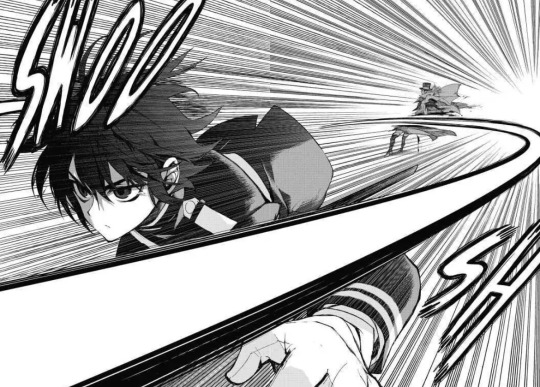
Characters
There are a ton of characters in this manga. In fact, there are so many that I feel like they forget about some of them (Where’d your revenge arc go, Yoichi? Where’d you disappear to, Narumi?) For that purpose, I am only going to go over who I deem the four most important to the story.
Starting off, we have Yuuichirou Hyakuya. He starts off as moody and rebellious, thinking of nothing about revenge for his orphan family. As he makes friends, his kind hearted nature shines through, yet he’s still hot blooded and impulsive. Due to the awful abuse and trauma he suffered as a kid, he views himself very negatively and lives with the sole purpose of caring for who he declares his family (which is pretty much anyone who is even remotely kind to him). Personally, I love Yuu a lot. He’s actually one of my favorite characters ever. He strives to save those he loves despite whether it’s feasibly possible to do so, a mindset that might be viewed as stupid by most. It’s the apocalypse after all. Most of humanity is dead. Vampires roam the street. There isn’t one person left on earth who hasn’t lost someone dear to them. In times like these, you have to do everything you can to survive, no matter how underhanded. Although, what’s the point of surviving if theres nothing to live for? If there’s nobody to love and be loved by? That’s why Yuu is willing to risk himself to save his family, a mindset that goes against the concept of an apocalypse. That’s why I think he’s a great protagonist for this type of series. On a side note, the vampires in this series are a direct contradiction to this way of thinking. They live forever and cannot die, most feel little to no emotion, and they typically view themselves as superior to humans. They live because they can’t die, but have no actual reason to live. I know this part on vampires isn’t really related to Yuu, but I wanted to take this opportunity to gush on how much I like how vampires are written as a species in this manga.
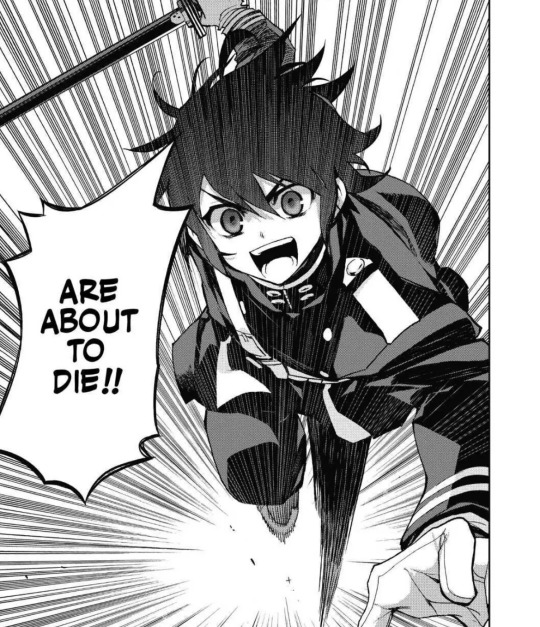
Moving on, Mikaela Hyakuya is the secondary protagonist of this manga. He’s Yuu’s fellow orphan who was supposedly slaughtered in the beginning of the story. He is resurrected as a vampire by the vampire queen herself, and aims to rescue Yuu from the clutches of the Moon Demon Company.

As a child, he is kind and optimistic, acting as a big brother to the other children in the orphanage. After the slaughter of the orphan children and his transformation into a vampire, he becomes apathetic and self-loathing, blaming himself for the death of the orphan family. He grows to despise both humans and vampires, only continuing to live for the sake of Yuu.
Like Yuu, Mika is also one of my favorite characters ever. He’s calm, intelligent, and cares for Yuu above all else. He’s the perfect compliment for the rash and self-sacrificing Yuu.

Next up, Shinoa Hiragi is the leader of the squad that Yuuichiro joins once he formerly joins the Moon Demon Company. While outwardly playful, she keeps her walls up at all times and prevents herself from feeling too many emotions. She spent her life looking after herself and herself only, as she couldn’t afford to do otherwise. This is why she ends up falling in love with Yuu, as his willingness to take care of his loved ones and to live freely is something that is the direct opposite to how she’s lived. While I don’t like the idea of Yuu and Shinoa together and don’t think it will happen either, her affection for Yuu makes a lot of sense for her character. However, I do believe that this series as a whole has a problem with defining many of their female characters by their romantic interest in a male one. I understand that the core theme of this series is love, but I feel like there should be more variation in the types of love that motivate them like their male characters do.
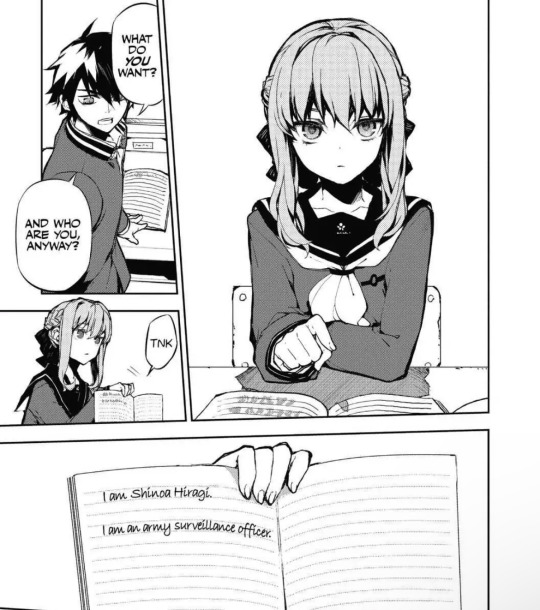
Lastly, Guren Ichinose is a lieutenant in the Moon Demon Company and the man who took in Yuu when he escaped the vampires. He is also the protagonist of two of the light novels. He’s very strong and goal oriented, but holds a deep care for his friends and strong guilt regarding his past. Yuu is very loyal to him, as Guren was the one who gave him a reason to keep going after the orphan children were slaughtered. I haven’t read the light novels, so I don’t know his character as well as I could, but I do like him based on what I’ve seen in this manga.

Art
I really like the art! However, it can be hard to follow what’s going on during a fight scene. I do feel as if that’s a common problem that I face when reading any fight scene from any manga, so maybe that’s just a personal problem. I would also like to note that the art style has changed over the course of its runtime. I’ve seen a lot of complaints about the new art style, and I definitely also prefer the old one. I don’t think it’s as horrible as some people are making it out to be, but sometimes it does look a bit off. I remember people freaking out over this panel of Guren in particular.
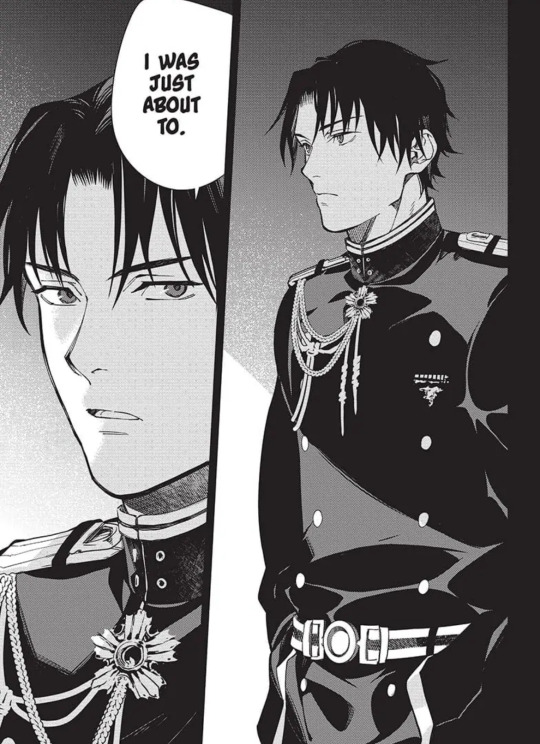
Overall thoughts
I have been reading this manga for about six or seven years now. I have an attachment to it that I can only describe as Stockholm syndrome, and I admit that the score I gave it is inflated by personal attachment. It has ruined my life and I wouldn’t have it any other way. Also, I would like to mention that I have only read up until volume 28 as that is the latest physical release in English. I vaguely know some of what happens after that but not in much detail. I’d recommend giving it a shot if you like post-apocalyptic settings and overly homoerotic shounen male friendships.
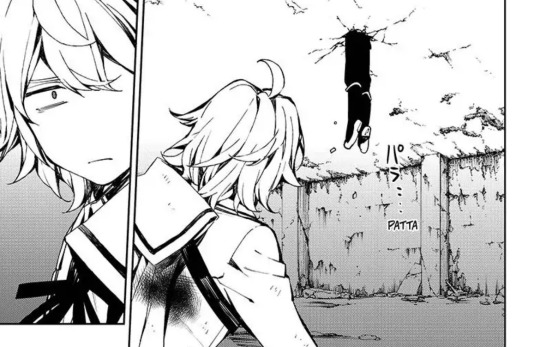
2 notes
·
View notes